|
11/10/2021 0 Comments Vicarious Liability of Company Directors not Automatic (Chartered Secretary Journal November 2021)
0 Comments
 CSR Provisions under the Companies Act, 2013 1. The enactment of the Companies Act, 2013 (in short "the Act") and enforcement of most of the provisions of the said Act with effect from 1st April, 2014 brought about significant changes in the way business was being conducted by the corporate India. The Act stipulated stricter penal provisions for non-compliance of the provisions of the Act by companies and many provisions of the Act prescribed penalty, including imprisonment, for the persons responsible for the conduct of the day to day management of the companies. Section 135 of the Act, for the first time in India, introduced the provision for Corporate Social Responsibility (CSR) for certain specified profitable companies and the Schedule attached to the Act stipulated the areas where the companies could spend the CSR funds. The CSR provisions of the Act, when initially implemented w.e.f. 1.4.2014 mandated that any company having net worth of Rs. 500 crore and more; or having a turnover of Rs. 1000 crore or more; or a net profit of Rs. 5 crore or more, will have to constitute its CSR Committee of its Board of Directors (BoD) and was required to spend in each financial year 2% of its average net profits that the company made during the three immediately preceding financial years. The concerned company was required to disclose in its report prepared under Section 134(3) of the Act, the fact about the composition of its CSR Committee. Even though many corporate leaders and researchers voiced that since CSR spend is basically a voluntary activity and being philanthropic in nature, yet why does the Government have to step in by enacting a law mandating CSR spend. Yet, the seriousness attached by the Government to CSR activities of companies can be appreciated from the fact that said section 135 also mandated that the CSR Committee formed by the company shall formulate and recommend to its Board of Directors, a CSR Policy which shall include the activities to be undertaken by such a company as specified in Schedule VII to the Act; and also recommend the amount of expenditure to be incurred on the activities referred to by the CSR Committee. The law also mandated that the CSR Committee is required to monitor the CSR Policy of the company from time to time. Further, the second proviso to section 135(5) initially stipulated that if the company fails to spend such amount, the Board of Directors of the concerned company will have to include in its report prepared under section 134(3)(o) of the Act the reasons for not spending the amount and place before the general meeting a report on the details of the policy developed and implemented by the company on CSR initiatives and also report the reasons for such non-compliance of the mandated CSR provisions. Challenges Faced by Industry in Complying with CSR Laws 2. Many teething problems were being faced by the concerned companies and from time to time, necessary clarifications were issued by the nodal regulatory agency, viz., the Ministry of Corporate Affairs (MCA) to help the companies by answering their queries and towards this, expert committees were also formed by the MCA. One of the problems being faced by the companies mandated to spend CSR funds was with regard to the interpretation of the provisions of average net profits in the three preceding financial years and another problem was what would happen if the company could not discharge its mandated obligation of CSR spend fully and further, how the non-spent balance amount was to be treated/carried forward. Of course, the Government had been taking a very pragmatic view to ameliorate the difficulties being faced by the corporate sector and was quick to address their grievances so as to advance the concept of "ease in doing business". The Companies (Amendment) Ordinance, 2018 was promulgated on 2.11.2018 and it addressed several issues raised by the corporate sector. However, since this could not be converted into Act, the Companies (Amendment) Ordinance, 2019 was issued on 12.1.2019, but that Ordinance also could not be converted into Act. Hence, the Companies (Second Amendment) Ordinance, 2019 was issued on 21.2.2019. Thereafter, the Companies (Amendment) Act, 2019 was passed and it received the assent of the President of India on 31.7.2019 and it incorporated all provisions of the Companies (Second Amendment) Ordinance, 2019 and in addition thereto, some new provisions were added in the Companies (Amendment) Act, 2019. Amendments of the Act with Regard to CSR provisions 3. Even though several amendments and changes were made in the Act through the aforesaid Ordinances and the Companies (Amendment) Act, 2019, yet, for the purposes of this article, only those provisions which impact the CSR provisions of the Act are highlighted here: (i)For example, the difficulties faced by the companies with regard to the interpretation of the ambiguity in sub-section (1) of section 135 of the Act to the applicability of the CSR provisions were addressed and vide amendment with effect from 19.9.2018 in sub-section (1) of section 135 the term "any financial year" is substituted with "immediately preceding financial year"; (ii)Initially, the law mandated (in sub-section (5) of section 135) that the BoD of the concerned company shall ensure that the company spends in every financial year at least two per cent of average netprofits of the company made during the three immediately preceding financial years, in pursuance of its CSR Policy. The difficulty faced by the companies in adhering to this legal mandate was addressed by the Government and the Companies Amendment Act, 2019, thus, added the words "or where the company has not completed the period of three financial years, since its incorporation, during such immediately preceding financial years" in sub-section (5) of section 135. This amendment, as and when enforced by the Government, will clear the doubts which surfaced in interpreting the said provision; (iii)With regard to unspent CSR amount and its reporting in the Director's Report under section 134, the Companies Amendment Act, 2019, has inserted the words "and, unless the unspent amount relates to any ongoing project referred to in sub-section (6), transfer such unspent amount to a Fund specified in Schedule VII, within a period of 6 months of the expiry of the financial year." This change will clear the doubts being faced by the companies about the treatment to be given to the unspent CSR amount. (iv)To further amplify how the unspent CSR amount is to be treated, an altogether new provision, namely, sub-section (6) has been added to section 135 of the Act which reads as under: "(6) Any amount remaining unspent under sub-section (5), pursuant to any ongoing project, fulfilling such conditions as may be prescribed, undertaken by a company in pursuance of its Corporate Social Responsibility Policy, shall be transferred by the company within a period of thirty days from the end of the financial year to a special account to be opened by the company in that behalf for that financial year in any scheduled bank to be called the Unspent Corporate Social Responsibility Account, and such amount shall be spent by the company in pursuance of its obligation towards the Corporate Social Responsibility Policy within a period of three financial years from the date of such transfer, failing which, the company shall transfer the same to a Fund specified in Schedule VII, within a period of thirty days from the date of completion of the third financial year." The aforesaid amendment is significant because it amply clarifies the treatment to be given by the concerned company with regard to its unspent CSR fund and mandates that despite such transfers, if any balance amount still remains unspent, it shall be transferred to a Fund specified in Schedule VII of the Act. (v)While, in its enthusiasm to ensure that the Parliament mandated CSR provisions in the Act are not taken lightly and are implemented in all seriousness by the industry concerned, the Government introduced through the Companies (Amendment) Act, 2019 stringent penal provisions including imprisonment for non-compliance of the CSR law. A new sub-section (7) was inserted to section 135, which reads as under: "(7) If a company contravenes the provisions of sub-section (5) or sub-section (6), the company shall be punishable with fine which shall not be less than fifty thousand rupees but which may extend to twenty-five lakh rupees and every officer of such company who is in default shall be punishable with imprisonment for a term which may extend to three years or with fine which shall not be less than fifty thousand rupees but which may extend to five lakh rupees, or with both." Since the terms "officer" defined in sub-section (59) of section 2 of the Act includes any Director or Key Managerial Personnel or any other person in accordance with whose directions or instructions the Board of Directors or any one or more of the Directors is or are accustomed to act, the aforesaid penal provision substantially affected the companies to which CSR provisions apply. Naturally, introduction of the stricter penal provisions were severely criticised and demands were made to decriminalise the said penal provisions and to make them civil in nature. In deference to the wishes of the corporate sector, the Government has not yet notified enforcement of the newly introduced penal provisions. In this regard it is worthwhile to note that the MCA had set up a Company Law Committee (CLC) on 18.09.2019 to make recommendations to the Government to, inter alia, re-categorize certain criminal compoundable offences to civil wrongs, carrying civil liabilities, to facilitate and promote ease of doing business and ease of living. The excerpt of the said CLC report dated 14.11.2019 with regard to penal provision under sub-section (7) of section 135 of the Act reads as under: "In case of default, the company shall be levied a penalty equal to twice the unspent CSR amount which is required to be transferred to the Account under sub-section (6) or one crore rupees, whichever is lower, whereas the officer in default shall be levied a penalty equal to one tenth of the unspent CSR amount which is required to be transferred to the Account under sub-section (6) or two lakh rupees, whichever is lower." The aforesaid recommendation, if accepted and incorporated eventually into the Act, will definitely help the companies in promoting ease of doing business and the Damocles' Sword of imprisonment hanging over the directors and officers of the companies due to non-compliance of CSR laws and regulations will get removed and it will help not only in ease of doing business but also ease of living by the concerned Directors and officers of the companies. This appears to be a welcome move and requires urgent consideration by the MCA. (vi) Further, another significant recommendation of the CLC is that a suitable provision be inserted in section 135(1) of the Act to enable the Central Government to enhance the threshold limits for triggering applicability of CSR provisions by way of Rules. However, critics point out that how such delegated legislation will go well with the principles enunciated in the Constitution of India needs to be seen, as such delegated legislation may be challenged in the Court. Current Status of CSR provisions in India 4. As reported in The Economic Times on 20th November 2019, the Minister of State for Finance and Corporate Affairs, in reply to a question on 19th November 2019 in the Rajya Sabha has said that CSR expenditure by the private sector companies increased from Rs. 10,302.50 crore in 2015-16 to Rs. 11,067 crore in 2017-18. However, the CSR spend by Public Sector Undertakings (PSUs) was Rs. 3,296 crore in 2016-17 came down to Rs. 2,553.36 crore in 2017-18. The Minister further clarified that the companies could now count contribution towards designated technology incubators and contributions to public funded institutions like IITs, national laboratories and autonomous bodies engaged in research as part of company's CSR expenditure. It needs to be noted that vide Notification issue on 11th October 2019 and its corrigendum dated 19th November 2019, the Ministry of Corporate Affairs has amended Schedule VII of the Act which relates to activities which may be included by the companies in their CSR policies. National CSR Awards 5. In this regard it is also pertinent to mention that National CSR awards have been instituted by the MCA to recognize corporate initiatives in the areas of CSR to achieve inclusive growth and sustainable development. The Indian Institute of Corporate Affairs, think-thank of the MCA, had rendered technical and logistics support for the conduct of the rigorous award process. At a function organized on 29th October 2019, the Hon'ble President of India observed that contribution through CSR is a true manifestation of the Trusteeship philosophy of the Father of the Nation. Awards were given under two categories, namely "Corporate Award for Excellence in CSR" and "Contribution of CSR in Challenging Circumstances". At the said award function, the Hon'ble Finance Minister also said that CSR is not merely contribution of funds by the corporate sector, but it is their contribution towards inclusive societies and this is a significant matter. Also, the Secretary, MCA, at the said function said CSR is no longer an act of philanthropy, rather it now flows out of business responsibility towards society and environment. This trend clearly indicates the positive manner in which the CSR activities are now being looked at by the Government. Conclusion 6. The decision of the Government to keep in abeyance enforcement of the criminal prosecution provisions which were enacted by the Companies Amendment Act 2019 in sub-section (7) of the section 135 of the Act will in effect halt the move for criminalization of violations of the CSR laws. Further, once the Government enforces the provisions of sub-section (6) of section 135 of the Act which allows flexible treatment to unspent CSR funds, it is hoped that the companies will heave a sigh of relief and the 5,382 companies to whom show-cause notices were issued by the MCA for CSR violations, will get an opportunity to conform to the Governmental directions with regard to CSR spend. Hopefully, this pragmatic approach will definitely create a conducive atmosphere for such an important aspect in corporate functioning, namely, the corporate social responsibility. ■■ 1/9/2020 0 Comments Key Highlights of Protective Provisions to Stressed-Asset Buyers Under IBC (Second Amendment) Bill, 2019 Published by Taxmann Publications in 'Sebi & Corporate Laws' Journal [2019] 112 taxmann.com 286 (Article) Date of Publishing: December 17, 2019 On Thursday, 12th December, 2019, the Insolvency and Bankruptcy Code (Second Amendment) Bill, 2019 was introduced in the Lok Sabha and the Bill, inter-alia, introduces many new provisions, most importantly the provisions which accord protection to stressed-asset buyers and also enhances the limit for home-buyers and debenture-holders (treated as financial creditors) for initiating corporate insolvency resolution process (CIRP) and this provision is proposed to be given retrospective effect. The intent of the IBC Second Amendment Bill aims at removing the difficulties and hurdles being faced by the new stressed-asset buyers and to make acquisition of the stressed-assets through CIRP more attractive to the investors. This article is an attempt to highlight only some of the key provisions of the Second Amendment Bill and it is expected to enlighten the professionals about the implication of the proposed amendments. While introducing the IBC Second Amendment Bill 2019, the Union Finance Minister reiterated the statement of objects and reasons for the Insolvency and Bankruptcy Code, 2016 (the Code) which was enacted with a view to consolidate and amend the laws relating to reorganisation and insolvency resolution of corporate persons, partnership firms and individuals in a time-bound manner for maximisation of value of assets of such persons, to promote entrepreneurship, availability of credit and balance the interests of all the stakeholders. Need for the IBC Second Amendment Bill 2019 As highlighted at the time of introduction of the IBC 2nd Amendment Bill 2019, Union Finance Minister stated that a need was felt to give the highest priority in repayment to last mile funding to corporate debtors to prevent insolvency, in case the company goes into corporate insolvency resolution process or liquidation, to prevent potential abuse of the Code by certain classes of financial creditors, to provide immunity against prosecution of the corporate debtor and action against the property of the corporate debtor and the successful resolution applicant, subject to fulfilment of certain conditions, and in order to fill the critical gaps in the corporate insolvency framework. Protection accorded to acquirer of stressed-assets under IBC The IBC 2nd Amendment Bill 2019 proposes to introduce a new section, namely Section 32A so as to provide that the liability of a corporate debtor for an offence committed prior to the commencement of the CIRP shall cease under certain circumstances enumerated therein. Sub-Section (1) of the proposed Section 32A reads as under: "After section 32 of the principal Act, the following section shall be inserted, namely:-- "32A. (1) Notwithstanding anything to the contrary contained in this Code or any other law for the time being in force, the liability of a corporate debtor for an offence committed prior to the commencement of the corporate insolvency resolution process shall cease, and the corporate debtor shall not be prosecuted for such an offence from the date the resolution plan has been approved by the Adjudicating Authority under section 31, if the resolution plan results in the change in the management or control of the corporate debtor to a person who was not-- (a) a promoter or in the management or control of the corporate debtor or a related party of such a person; or (b) a person with regard to whom the relevant investigating authority has, on the basis of material in its possession, reason to believe that he had abetted or conspired for the commission of the offence, and has submitted or filed a report or a complaint to the relevant statutory authority or Court: Provided that if a prosecution had been instituted during the corporate insolvency resolution process against such corporate debtor, it shall stand discharged from the date of approval of the resolution plan subject to requirements of this sub-section having been fulfilled: Provided further that every person who was a "designated partner" as defined in clause (j) of section 2 of the Limited Liability Partnership Act, 2008, an "officer who is in default", as defined in clause (60) of section 2 of the Companies Act, 2013, or was in any manner incharge of, or responsible to the corporate debtor for the conduct of its business or associated with the corporate debtor in any manner and who was directly or indirectly involved in the commission of such offence as per the report submitted or complaint filed by the investigating authority, shall continue to be liable to be prosecuted and punished for such an offence committed by the corporate debtor notwithstanding that the corporate debtor's liability has ceased under this sub-section." Therefore, as can be seen from the aforesaid, while the new acquirer of stressed-asset gets protection from prosecutions launched against the corporate debtor, the said protection does not extend to the erstwhile promoters, directors, key managerial personnel, associates or related parties of the erstwhile promoters of the corporate debtor who were directly or indirectly involved in the commission of such offence as per the report submitted or complaint filed by the investigating authority. It is also pertinent to mention that sub-section (2) of the proposed Section 32A which is being introduced, clearly specifies that "no action shall be taken against the property of the corporate debtor in relation to an offence committed prior to the commencement of the corporate insolvency resolution process of the corporate debtor, where such property is covered under a resolution plan approved by the Adjudicating Authority under section 31." The aforesaid immunity to the corporate debtor under Section 32A(1) and to the properties of the corporate debtor under Section 32A(2) is applicable only in respect of the approved resolution plan under Section 31 of the IBC or sale of liquidation assets under the provisions of Chapter III of Part II of the IBC which results in a change of control of the corporate debtor to a person who was not (a) a promoter or in the management or control of the corporate debtor or a related party of such a person; or (b) a person with regard to whom the relevant investigating authority has, on the basis of material in its possession reason to believe that he had abetted or conspired for the commission of the offence, and has submitted or filed a report or a complaint to the relevant statutory authority or Court. In this connection, it is relevant to note that the aforesaid proposed changes in the IBC do not dilute or exempt the liability of the erstwhile director or partner of the corporate debtor, as the case may be, as per Section 66 of the IBC, who was involved in fraudulent trading or wrongful trading or who knew or ought to have known that there was no reasonable prospect of avoiding the commencement of a CIRP in respect of such corporate debtor and who did not exercise due diligence in minimising the potential loss to the creditors of the corporate debtor. On an application made by the resolution professional during CIRP, the Adjudicating Authority may by an order direct that such a person shall be liable to make such contribution to the assets of the corporate debtor as it may deem fit. Even though this is a very important provision available to the Resolution Professional during CIRP, yet it is rarely used, which could have deterred economic offenders. Interestingly, Explanation (ii) to the proposed Section 32A(2) clarifies that nothing prevents from initiating action against the property of any person other than the corporate debtor or a person who has acquired such property through corporate insolvency resolution process or liquidation process under this Code and fulfils the requirements specified in this section, against whom such an action may be taken under such law as may be applicable. Proposed sub-section (3) of Section 32A mandates that notwithstanding the immunity given in this section, the corporate debtor and any person who may be required to provide assistance under such law as may be applicable to such corporate debtor or person, shall extend all assistance and co-operation to any authority investigating an offence committed prior to the commencement of the corporate insolvency resolution process. In this connection, it is relevant to note that the aforesaid proposed changes in the IBC do not dilute or exempt the liability of the erstwhile director or partner of the corporate debtor, as the case may be, as per Section 66 of the IBC, who was involved in fraudulent trading or wrongful trading or who knew or ought to have known that there was no reasonable prospect of avoiding the commencement of a CIRP in respect of such corporate debtor and who did not exercise due diligence in minimising the potential loss to the creditors of the corporate debtor. On an application made by the resolution professional during CIRP, the Adjudicating Authority may by an order direct that such a person shall be liable to make such contribution to the assets of the corporate debtor as it may deem fit. However, it may be important to highlight that the immunity granted under Section 32A of the IBC Amendment Bill is likely to create problems for the investigating agencies like Serious Fraud Investigation Office (SFIO), Enforcement Directorate (ED), Central Bureau of Investigation (CBI), prosecuting agency of the Ministry of Corporate Affairs and may delay completion of the prosecution of such offenders till the aforesaid immunity provisions get tested in the Courts of law and the critical issues get settled. Enhancement of Minimum Threshold for Certain Financial Creditors to Initiate CIRP As per the existing Section 7 of the IBC, a financial creditor, either by itself or jointly with other financial creditors or any other person on behalf of the financial creditor, as may be notified by the Central Government, may file an application for initiating corporate insolvency resolution process against a corporate debtor before the Adjudicating Authority when a default has occurred. The IBC 2nd Amendment Bill 2019 proposes to enhance the threshold limit for initiating CIRP by certain classes of financial creditors and new provisos are being inserted in sub-section (1) of the existing Section 7 of the IBC. Basically, the first proviso proposed to be inserted deal with such class of financial creditors as referred to in clauses (a) and (b) of sub-section (6A) of Section 21 of the IBC and in respect thereof, an application for initiating corporate insolvency resolution process shall be filed jointly by not less than one hundred of such creditors in the same class or not less than ten per cent. of the total number of such creditors in the same class, whichever is less. The next proviso proposed to be inserted in Section 7 of the IBC relates to financial creditors who are allottees under a real estate project and states that an application for initiating corporate insolvency resolution process shall be filed jointly by not less than one hundred of such allottees under the same real estate project or not less than ten per cent of the total number of such allottees under the same real estate project, whichever is less. The Bill further clarifies that where an application for initiating the corporate insolvency resolution process against a corporate debtor has been filed by a financial creditor referred to in the first and second provisos and has not been admitted by the Adjudicating Authority before the commencement of the Insolvency and Bankruptcy Code (Second Amendment) Act, 2019, such application shall be modified to comply with the requirements of the first and second provisos within thirty days of the commencement of the said Act, failing which the application shall be deemed to be withdrawn before its admission. This change is proposed to be made applicable retrospectively and may face some legal objections from affected quarters. Going-Concern Basis of Corporate Debtor During CIRP – Extension of Licences, Permits, etc. Another significant amendment introduced in the IBC 2nd Amendment Bill 2019 relates to the facilitating the operation of the corporate debtor as a "going concern" during the CIRP. The Bill proposes to insert the following 'Explanation'to the sub-section (1) of Section 14 of the Code "For the purposes of this sub-section, it is hereby clarified that notwithstanding anything contained in any other law for the time being in force, a license, permit, registration, quota, concession, clearances or a similar grant or right given by the Central Government, State Government, local authority, sectoral regulator or any other authority constituted under any other law for the time being in force, shall not be suspended or terminated on the grounds of insolvency, subject to the condition that there is no default in payment of current dues arising for the use or continuation of the license, permit, registration, quota, concession, clearances or a similar grant or right during the moratorium period" Also, after sub-section (2) of Section 14, the following new sub-section is proposed to be inserted, namely: "(2A) The supply of goods or services that the interim resolution professional or resolution professional, as the case may be, considers critical to protect and preserve the value of the corporate debtor and manage the operations of such corporate debtor as a going concern, then the supply of such goods or services shall not be terminated, suspended or interrupted during the period of moratorium, except if such corporate debtor has not paid dues arising from such supply during the moratorium period or in such circumstances as may be specified." Conclusion While upholding the constitutional validity of the IBC, the Supreme Court of India in Swiss Ribbons v. Union of India [2019] 101 Taxmann.com 389/152SCL365 has stated that the IBC is a legislation which deals with economic matters and, in the larger sense, deals with the economy of the country as a whole. The experiment contained by the Code judged by the generality of its provisions and not by the so-called crudities and inequities have passed Constitutional muster. In the working of the Code, the flow of financial resources to the commercial sector in India has increased exponentially as a result of financial debts being repaid. The experiment conducted in enacting the Code is proving to be largely successful. The defaulter's paradise is lost. In its place economy's rightful position has been regained. The proposed amendment in the IBC 2nd Amendment Bill 2019 is in the right direction to facilitate the Government's keenness to promote ease in doing business in India and also helps in removing certain bottlenecks in sale/change of hands in respect of the stressed-assets and also to streamline initiation of CIRP in respect of real estate companies. The changes proposed are definitely a welcome move which augurs well for the Indian business scenario. ■■ 12/26/2019 0 Comments Economic Offences & Money-Laundering: Supreme Court On Refusal To Grant Anticipatory Bail To High-Profile AccusedDelep Goswami, FCS, Advocate Anirrud Goswami, Advocate,
Supreme Court of India Goswami & Goswami Advocates [email protected] [email protected] (+91) 9891169035 (+91) 9711117019 Published by Taxmann Publications in 'Sebi & Corporate Laws' Journal December 20, 2019[2019] 112 taxmann.com 242 (Article) 174 Views Introduction 1. In the wake of recent spate of cases of "economic offences" by high profile offenders and protracted litigations on whether to grant pre-arrest bail/regular bail to such offenders and the Courts holding different views at different times depending on the facts and circumstances of such cases, it has become necessary to highlight some broad parameters and principles being followed by the Courts on this important subject. This article is limited to the reasons for refusal to grant anticipatory bail. It is hoped that professionals dealing with this subject will greatly benefit from the discussions on this subject. Supreme Court on What Constitutes an "Economic Offence":-- 2. Observing that economic offences constitute a class apart and need to be visited with a different approach in the case of bail, in Y.S. Jagan Mohan Reddy v. CBI (2013-7-SCC-439), the Supreme Court of India has held as under :- "34. Economic offences constitute a class apart and need to be visited with a different approach in the matter of bail. The economic offences having deep-rooted conspiracies and involving huge loss of public funds need to be viewed seriously and considered as grave offences affecting the economy of the country as a whole and thereby posing serious threat to the financial health of the country. 35. While granting bail, the Court has to keep in mind the nature of accusations, the nature of evidence in support thereof, the severity of the punishment which conviction will entail, the character of the accused, circumstances which are peculiar to the accused, reasonable possibility of securing the presence of the accused at the trial, reasonable apprehension of the witnesses being tampered with, the larger interests of the public/State and other similar considerations." Appeal in the Supreme Court against Delhi High Court's order refusing to grant anticipatory bail:-- 3. In Criminal Appeal No.1340/2019 filed in the Supreme Court in re: P. Chidambaram v. Directorate of Enforcement, the appeal related to the alleged irregularities in Foreign Investment Promotion Board (FIPB) clearance given to INX Media Private Limited for receiving foreign investment to the tune of Rs. 305 crores against approved inflow of Rs. 4.62 crores. The High Court of Delhi rejected the appellant's plea for anticipatory bail in the case registered by the Central Bureau of Investigation (CBI) under Section 120B, read with Section 420 of the Indian Penal Code, 1860 (IPC) and under Section 8 and Section 13(2), read with Section 13(1)(d) of the Prevention of Corruption Act, 1988. By the impugned order dated 20.8.2019, the High Court also refused to grant anticipatory bail in the case registered by the Enforcement Directorate (ED) in case registered vide ECIR No.07/HIU/2017 punishable under Sections 3 and 4 of the Prevention of Money Laundering Act, 2002 (PMLA). The appellant was arrested and remanded to custody in the CBI case and, hence, the appellant could not seek anticipatory bail after he was arrested. The case of the prosecution was that in 2007, INX Media Private Limited (IMPL) approached FIPB seeking approval for inflow of FDI to the extent of Rs. 4.62 crores and the FIPB recommended the proposal of IMPL subject to the approval of the appellant, who was the then Union Finance Minister. FIPB did not approve any downstream investment by IMPL in another entity, namely, INX News Limited (INL). In violation of the conditions of FIPB approval, IMPL deliberately made a downstream investment in the share capital of INL and generated more than Rs. 305 crores FDI in IMPL by issuing shares to foreign investors at a premium of over Rs. 800 per share. Upon receipt of a complaint against IMPL in respect of a cheque issued for Rs. 10 lakhs, the Income Tax Department sought for information from FIPB and IMPL justified its action saying that the downstream investment was authorised and made in accordance with FIPB approval. In order to get out of possible prosecution, IMPL entered into a criminal conspiracy with Mr. Karti Chidambaram (KC), Promoter-Director of Chess Management Services Private Limited (CMSPL) and the appellant, the then Finance Minister of Union of India. The FIR further alleged, inter-alia, that: (a) for services rendered by KC to IMPL through CMSPL in getting the issues scuttled by influencing public servants of FIPB, consideration in the form of payments were received against invoices raised on IMPL by another entity, namely, Advantage Strategic Consultants Private Limited (ASCPL) closely associated with KC and (b) the very reason for getting the invoices raised in ASCPL's name for services rendered by CMSPL was with a view to conceal the identity of KC inasmuch as on the day when the invoices were raised and payment was made, KC was the Promoter-Director of CMSPL, whereas ASCPL was being controlled by him indirectly. It was alleged that the invoices approximately for an amount of Rs. 3.50 crores were falsely raised in favour of IMPL in the name of other companies in which KC was having substantial interest either directly or indirectly and that such invoices were falsely raised for creation of acquisition of media content, consultancy in respect of market research, etc. It was also alleged that INX Media Group in its record had clearly mentioned the purpose of payment of Rs. 10 lakhs to ASCPL as 'towards management consultancy charges towards FIPB notification and clarification'. Alleging that the above acts of omission and commission prima facie disclose commission of offence, CBI had registered FIR No.220/2017 on 15.5.2017 and on the basis of the said FIR registered by CBI, the ED registered a case in ECIR No.07/HIU/2017 against the aforesaid accused persons for allegedly committing the offence punishable under Sections 3 and 4 of the Prevention of Money Laundering Act, 2002 (PMLA). Ever since the registration of the cases in 2017, there were various proceedings seeking bail and number of other proceedings pending which were filed by KC and other accused and finally the Delhi High Court granted bail to KC on 23.3.2018 in IMPL case filed by CBI. Thereafter, the appellant moved the Delhi High Court seeking anticipatory bail in both the CBI case and money-laundering case filed by ED. On 25.07.2018, the Delhi HC granted the appellant interim protection from arrest in both the cases and the same was extended till 20.8.2019, the date on which the High Court dismissed the appellant's petition refusing to grant anticipatory bail. Reasons why High Court refused to grant anticipatory bail to the appellant:-- 4. The High Court dismissed the application and refused to grant anticipatory bail to the appellant by holding that it was a classic case of money-laundering and held that the alleged irregularities committed by the appellant made out a prima facie case for refusing pre-arrest bail to the appellant. The Ld. Single Judge also held that the gravity of the offence and the evasive reply given by the appellant to questions put to him while he was under the protective cover extended to him by the Court, were twin factors which weighed to deny the pre-arrest bail. Being aggrieved, the appellant preferred an appeal to the Supreme Court of India. Arguments advanced on behalf of the accused Appellant in Supreme Court:-- 5. Lengthy arguments were heard as number of hearings stretched over long time. Learned Senior Counsels appearing for the appellant, Mr. Kapil Sibal and Mr. Abhishek Manu Singhvi made meticulous submissions on the concept of life and liberty enshrined in Article 21 of the Constitution of India to urge that the appellant was entitled to the privilege of anticipatory bail. Arguments were also advanced as to whether the Court can look into materials produced by respondent-ED to seek custody of the appellant when the appellant was not confronted with those documents on the three dates of interrogation. Interlocutory application was filed by the appellant to produce the transcripts of the questions put to the appellant and his answers that were recorded by ED. Mr. Sibal also argued that the KC was neither a shareholder nor a Director of ASCPL and had nothing to do with ASCPL whereas ED falsely alleged that KC had been controlling ASCPL to whom money had been paid by IMPL. He also contended that the Ld. Single Judge of the High Court in its judgement simply copy-pasted paragraphs of the note given by ED to the Court and this pointed out that the counter-affidavit filed by ED became the judgement of the Ld. Single Judge and this was not the correct judicial process to deal with anticipatory bail applications. Next, it was argued that ED could not randomly produce documents in Court behind the back of the appellant for seeking custody of the appellant. He strongly objected to the High Court receiving a "sealed cover" and looking into those documents collected during investigation allegedly showing the money trail in the name of companies and money-laundering, without affording an opportunity to the accused to counter those allegations. Mr. Sibal also argued that the appellant had well cooperated with ED and, thus, the ED could not allege that appellant was non-cooperative and if the High Court had permitted filing of interrogation transcript, they would show whether appellant was evasive or not during his questioning as alleged by the ED. Therefore, Mr. Sibal submitted that provisions of anticipatory bail under Section 438 CrPC have to be interpreted in a fair and reasonable manner and that the High Court had mechanically rejected the anticipatory bail and that in the alleged offence in the case, since everything was borne out by the records, there was no question of the appellant being evasive. It was further submitted that co-accused KC and Padma Bhaskararaman were granted bail and the other accused Indrani Mukherjea and Peter Mukherjea were on statutory bail and, therefore, the appellant was also entitled to bail on parity. Senior Counsel, Mr. Singhvi's main contentions were that the High Court could not deny anticipatory bail to the appellant on the basis of materials produced by ED in a "sealed cover" before the Court which were never shown to the appellant, nor was the appellant confronted with the same and that the alleged offences were not scheduled offences under the PMLA at the time of their occurrence and, hence, prosecution under PMLA was not maintainable. Mr. Singhvi also took strong exception to the two factors stated by the High Court in its impugned order for denying pre-arrest bail, i.e., (i) gravity of the offence; and (ii) the appellant was evasive during interrogation. It was submitted that gravity of the offence cannot be the perception of the individual or of the Court and the test of gravity of offence should be the punishment prescribed by the statute for the offence committed. Insofar as the finding of the High Court about the appellant being evasive during interrogation, Mr. Singhvi submitted that ED cannot expect an accused to give answers in the manner they want and that accused was entitled to protection under Article 20(3) of the Indian Constitution. Countering the aforesaid submissions, the learned Solicitor General (SG) submitted that grant of anticipatory bail was not part of Article 21 of the Indian Constitution and argued that having regard to the materials collected by ED and specific inputs and in view of the provisions of the special enactment like PMLA, custodial interrogation of the appellant was required and he was not entitled to the privilege of anticipatory bail. The Ld. SG also took the Supreme Court through the Statement of Objects and Reasons and salient features of PMLA and submitted that India, being part of the global community, had a responsibility to crack down on money-laundering with an effective legislation and that PMLA was a result of joint initiatives taken by several nations. He further submitted that (a) money-laundering posed a serious threat to the financial system and financial integrity of the nation and has to be sternly dealt with; (b) PMLA offence has two dimensions: predicate offence and money-laundering; (c) Money-laundering is a separate and independent offence punishable under Section 4, read with Section 3 of the PMLA; (d) Under Section 19 of PMLA, specified officers on the basis of material in possession and having reason to believe that the person has been guilty of the offence under PMLA, have the power to arrest such person; and (e) necessary safeguards were also enshrined in Section 19 of the Act. He submitted that the ED had collected cogent materials to show that it had a case of money-laundering against the accused and that it had issued letter rogatory and that if the Court intervenes by granting anticipatory bail, ED cannot exercise the statutory right of arrest and interrogate the appellant. He further submitted that during investigation, the ED had collected materials and overseas banks had given specific inputs regarding the companies and properties where money had been parked in the name of shell companies and the said money had been used to make legitimate assets and that custodial interrogation was necessary with regard to the materials so collected. Supreme Court Refuses to Grant Anticipatory Bail at the Stage of Investigation:-- 6. In its judgement dated 5.9.19 in P. Chidambaram v. Directorate of Enforcement (Criminal Appeal No.1340/2019), the Supreme Court Division Bench comprising Hon'ble Justice (Ms.) R. Banumathi and Hon'ble Justice AS Bopanna observed and held that: "Grant of anticipatory bail at the stage of investigation may frustrate the investigating agency in interrogating the accused and in collecting the useful information and also the materials which might have been concealed. Success in such interrogation would elude if the accused knows that he is protected by the order of the Court. Grant of anticipatory bail, particular in economic offences would definitely hamper the effective investigation. Having regard to the materials said to have been collected by the respondent Enforcement Directorate and considering the stage of the investigation, we are of the view that it is not a fit case to grant anticipating bail." The Apex Court further observed that "in a case of money-laundering, where it involves many stages of placement, layering, i.e., funds moved to other institutions to conceal origin and interrogation, i.e., funds used to acquire various assets, it requires systematic and analysed investigation, which would be of great advantage. As held in Anil Sharma, success in such interrogation would elude if the accused knows that he is protected by a pre-arrest bail order. Section 438 Cr.PC. is to be invoked only in exceptional cases where the case alleged is frivolous or groundless. In the case in hand, there are allegations of laundering the proceeds of the crime. The ED claims to have certain specific inputs from various sources, including overseas banks. Letter rogatory is also said to have been issued and some responses have been received by the department. Having regard to the nature of allegations and the stage of the investigation, the investigating agency has to be given sufficient freedom in the process of investigation. Though we do not endorse the approach of the learned Single Judge in extracting the note produced by ED, we do not find any ground warranting interference with the impugned order. Considering the facts and circumstances of the case, grant of anticipatory bail to the appellant will hamper the investigation and this is not a fit case for exercise of discretion to grant anticipatory bail to the appellant." While dealing with the appeal, the Supreme court also noted and referred to its earlier decisions in Dukhishyam Benupani, Assistant Director, Enforcement Directorate (FERA) v. Arun Kumar Bajoria (1998-1-SCC-52) and in Enforcement Officer, TED, Bombay v. Bher Chand Tikaji Bora and others (1999-5-SCC-720), where the Supreme Court was hearing an appeal by ED against orders of Ld. Single Judge of the Bombay High Court granting anticipating bail to respondent therein and where the Supreme Court set aside the order of the Single Judge granting anticipatory bail to the said accused. The Supreme Court further observed that the privilege of pre-arrest bail should be granted only in exceptional cases and that judicial discretion conferred upon the Court has to be properly exercised after application of mind as to the nature and gravity of the accusation, possibility of applicant fleeing justice and other factors to decide whether it is a fit case for grant of anticipatory bail. Grant of anticipatory bail, to some extent, interferes in the sphere of investigation of an offence and, hence, the Court must be circumspect while exercising such power for grant of anticipatory bail. Anticipatory bail is not to be granted as a matter of rule and it has to be granted only when the Court is convinced that exceptional circumstances exist to resort to that extraordinary remedy. The Court must also keep in view that a criminal offence in economic and money-laundering cases is not just an offence against an individual, rather the larger societal interest is at stake. Therefore, a delicate balance is required to be established between two rights – safeguarding the personal liberty of an individual and the societal interest. It cannot be said that refusal to grant anticipatory bail would amount to denial of rights conferred upon the appellant under Article 21 of the Indian Constitution. Thereafter, the Supreme Court, in the aforementioned P. Chidambaram's case (supra) dismissed the appeal and observed that the appellant can work out his remedy in accordance with law and that as and when the application for regular bail is filed, the same shall be considered by the learned trial court on its own merits and in accordance with law, without being influenced by any of the observations made in the Supreme Court's aforesaid judgement of refusal to grant anticipatory bail and the impugned order of the High Court. ■■ |
Author@Delep Goswami, F.C.S., Advocate; Archives
November 2021
Categories |

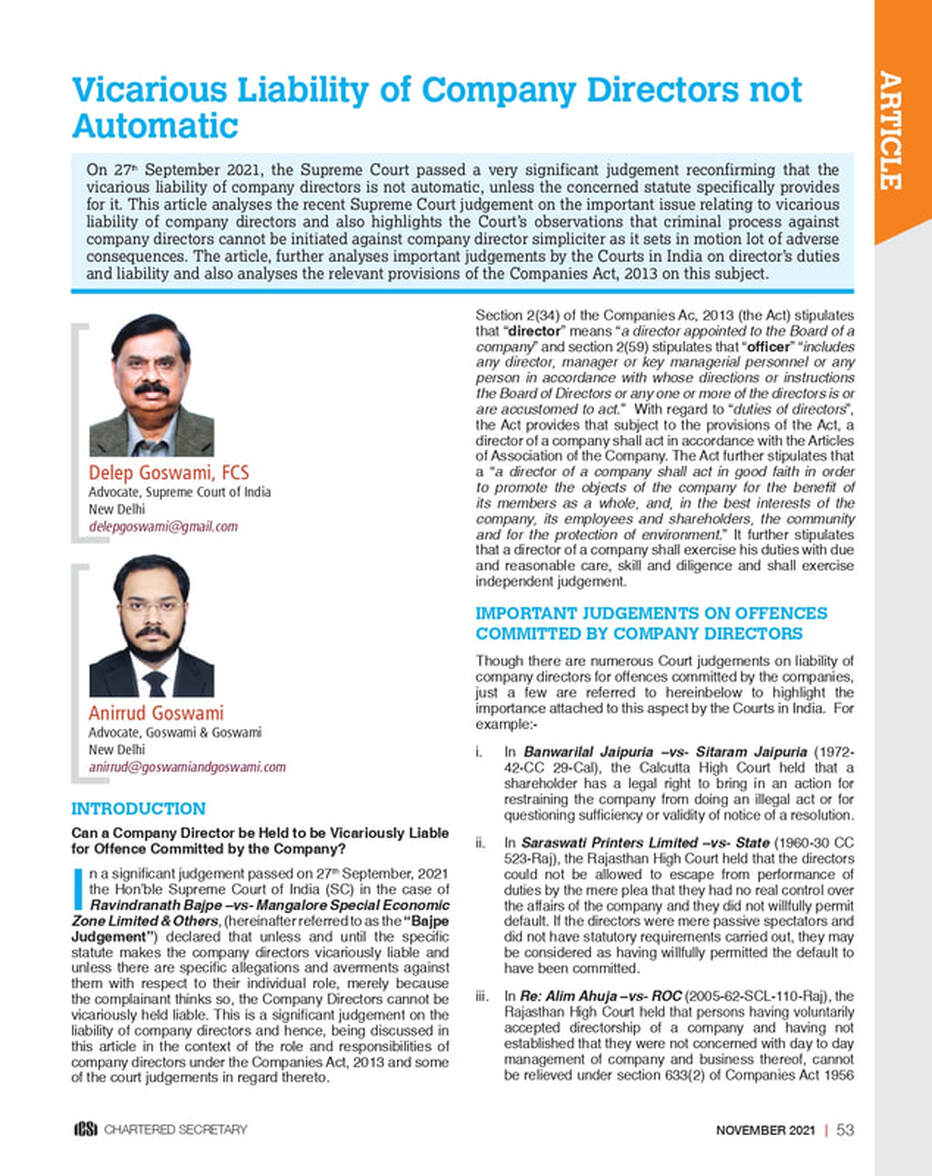
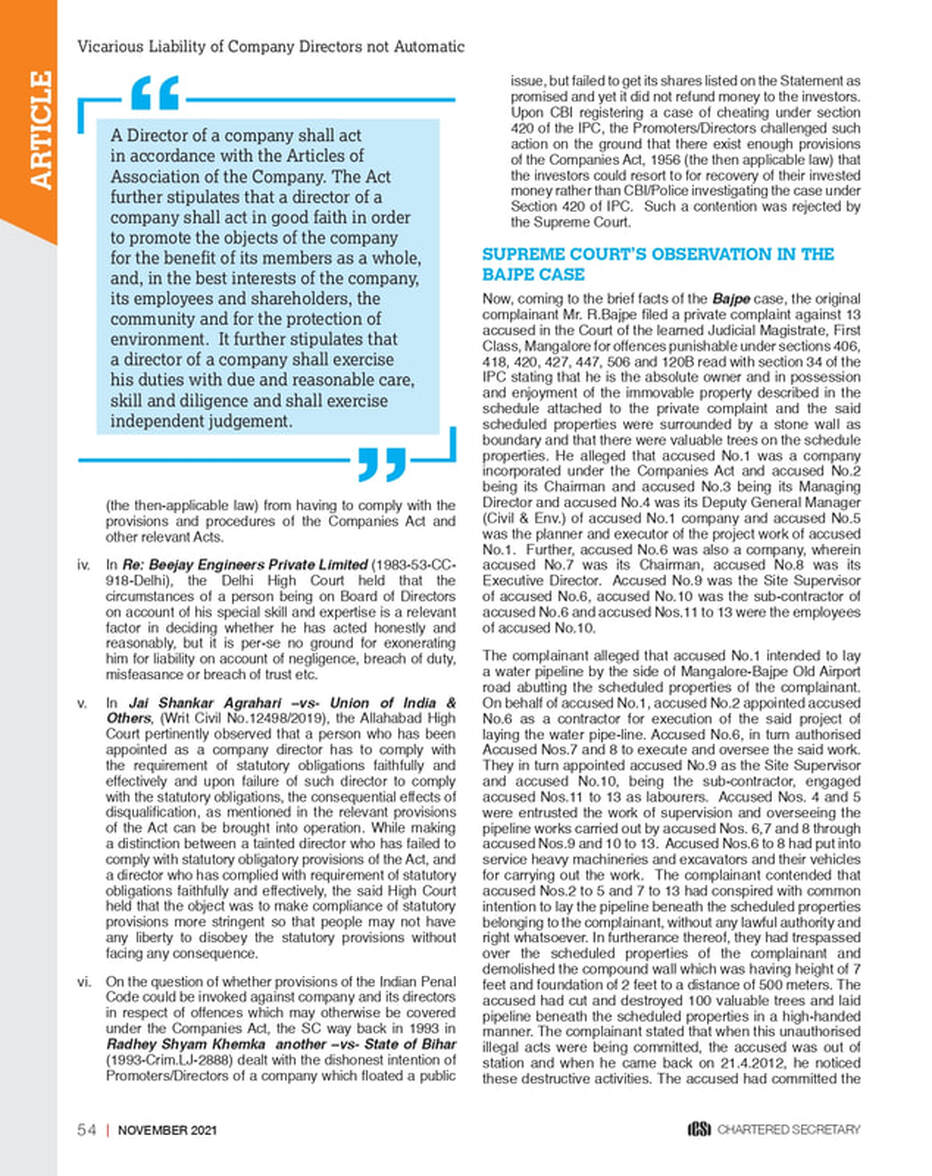
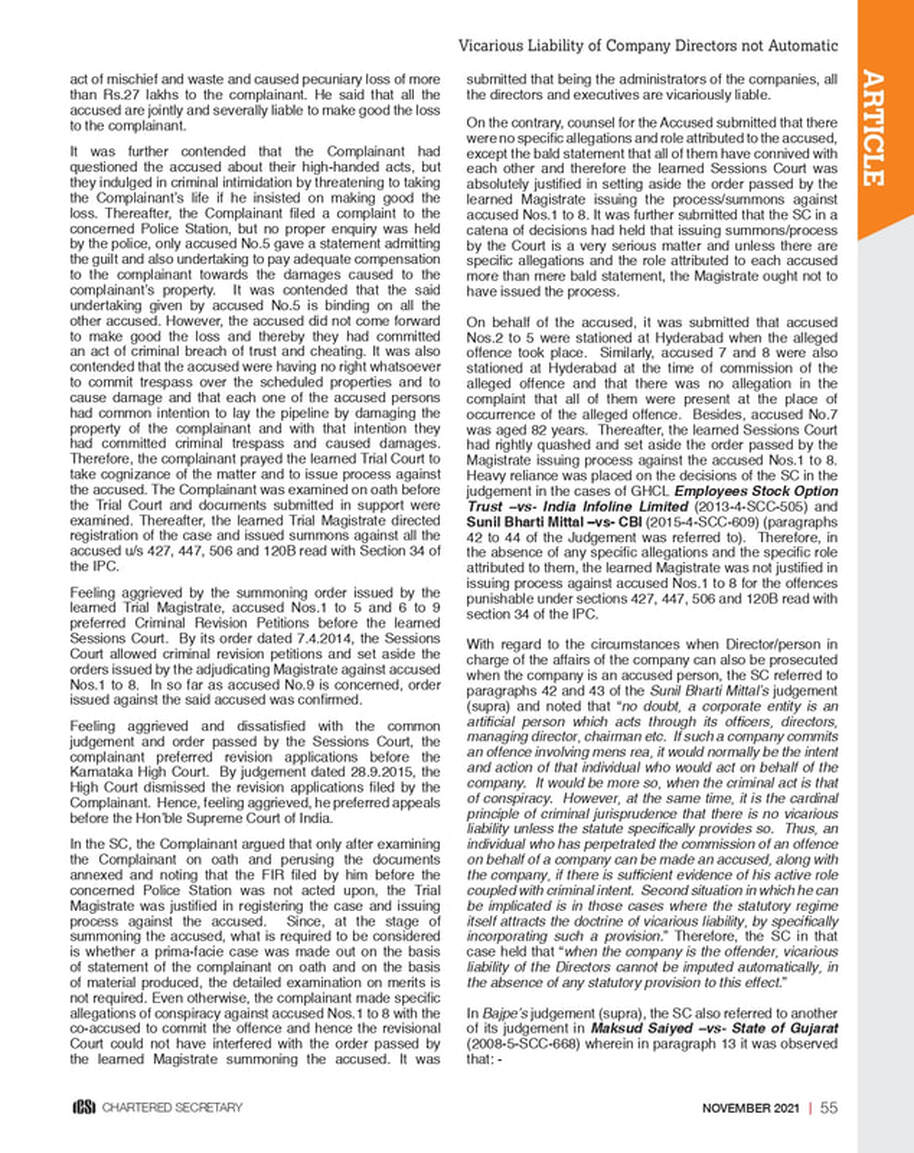
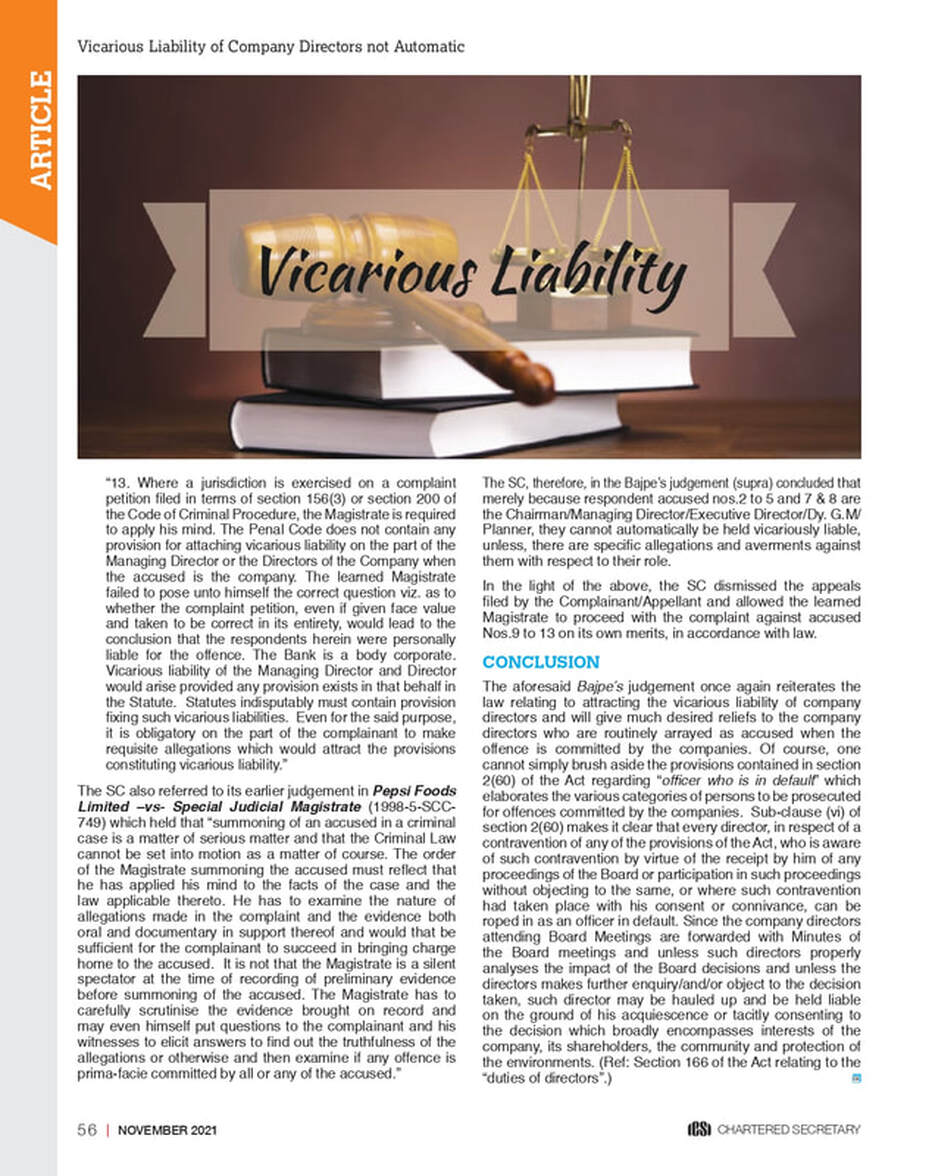

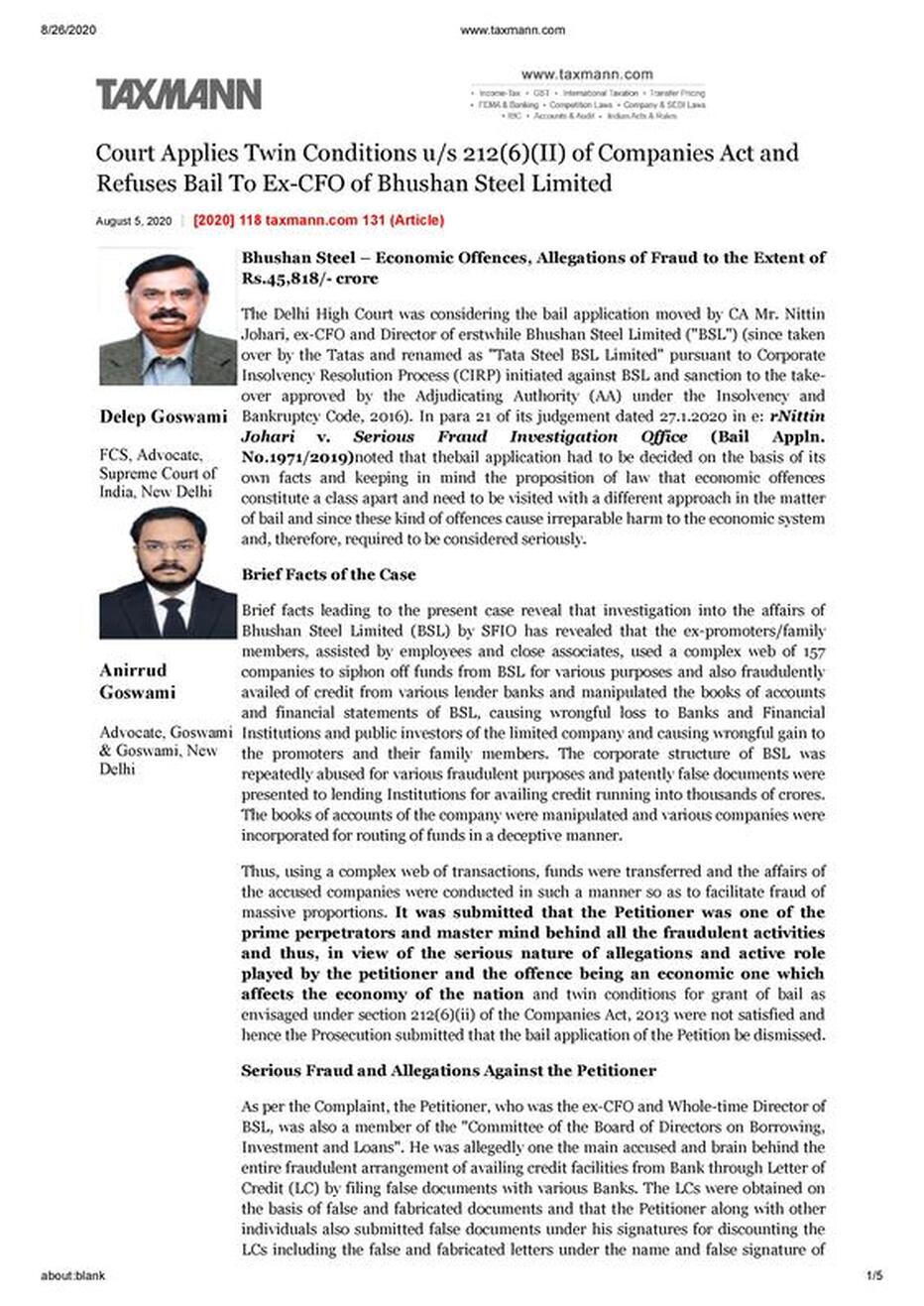
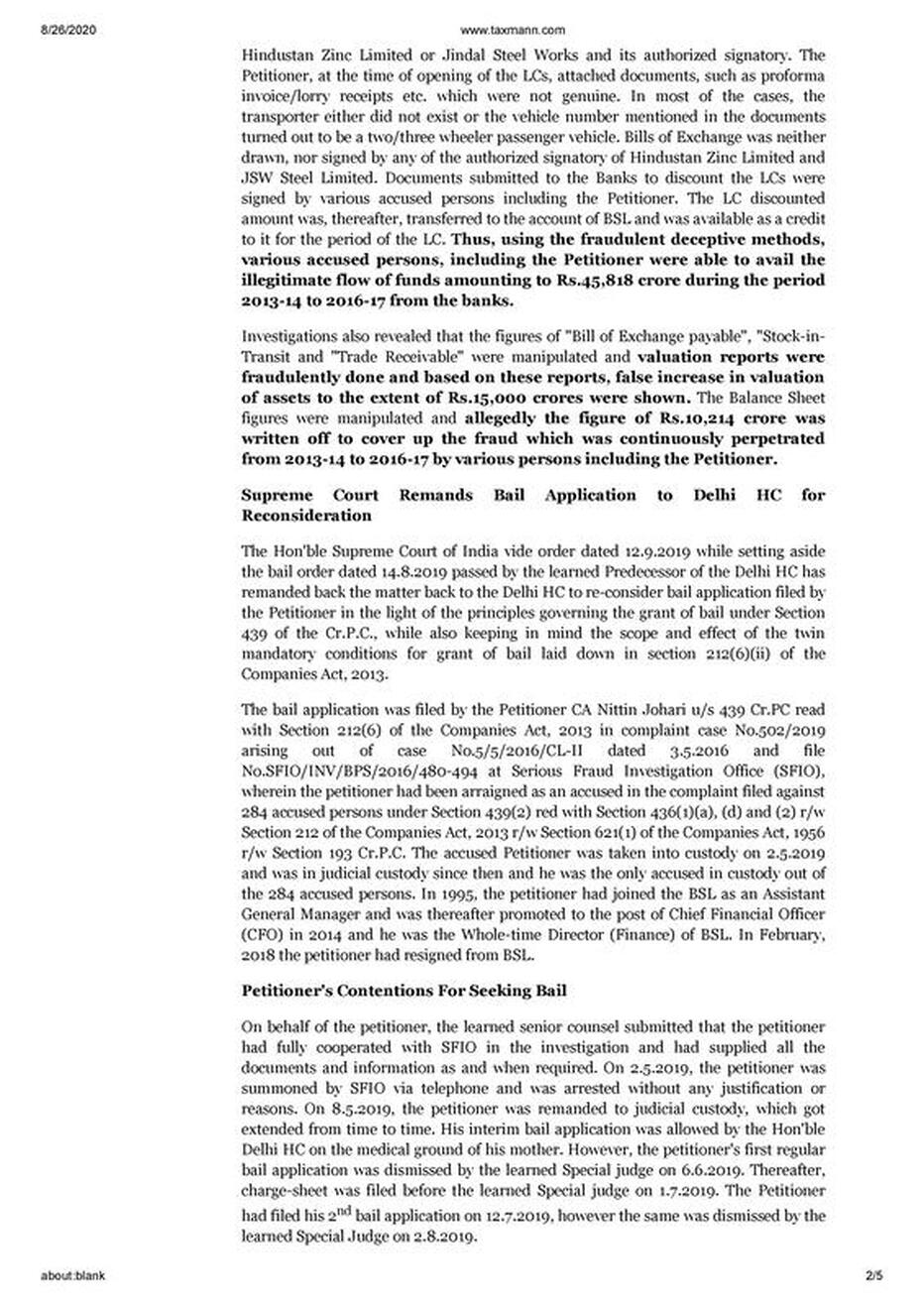
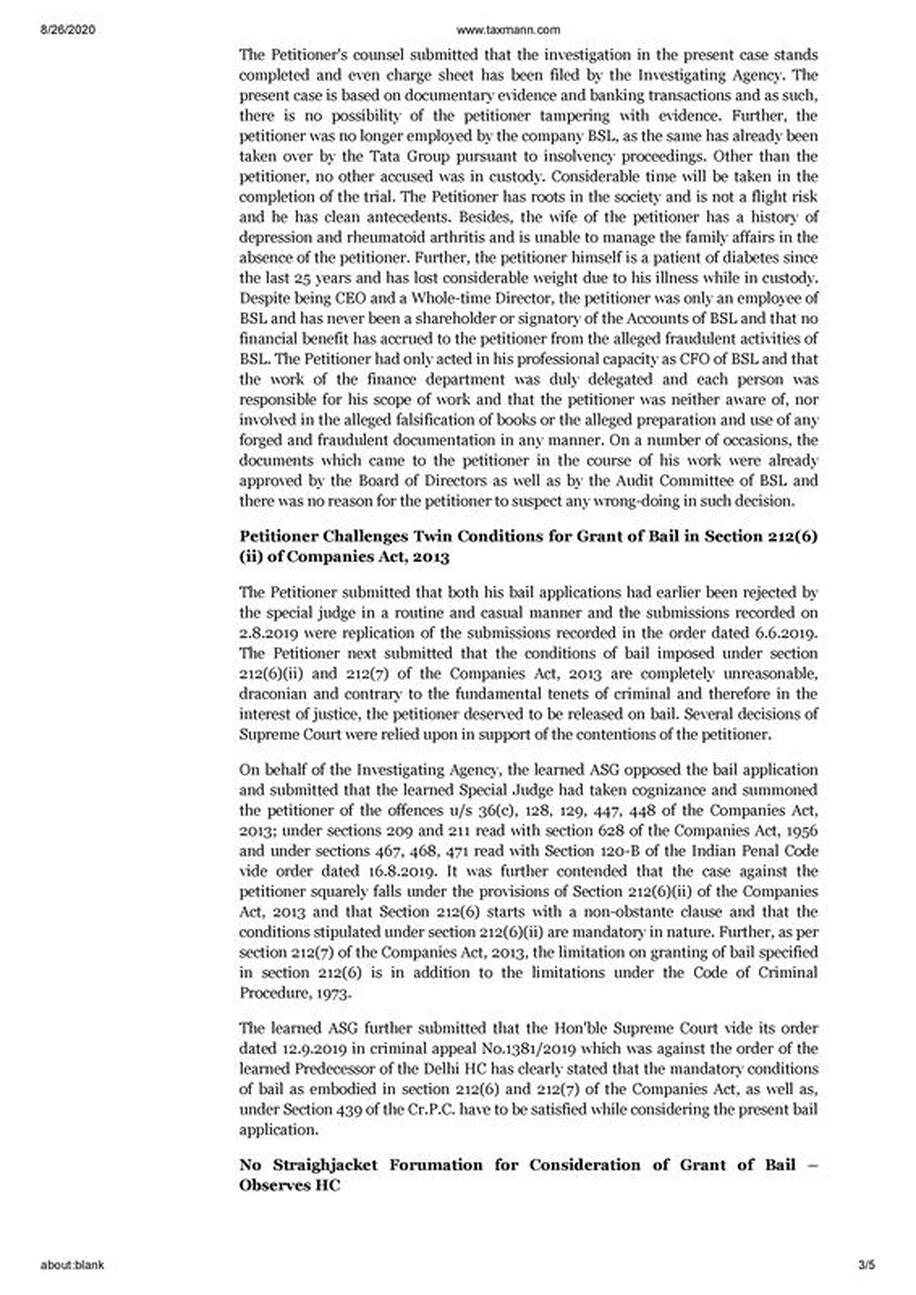
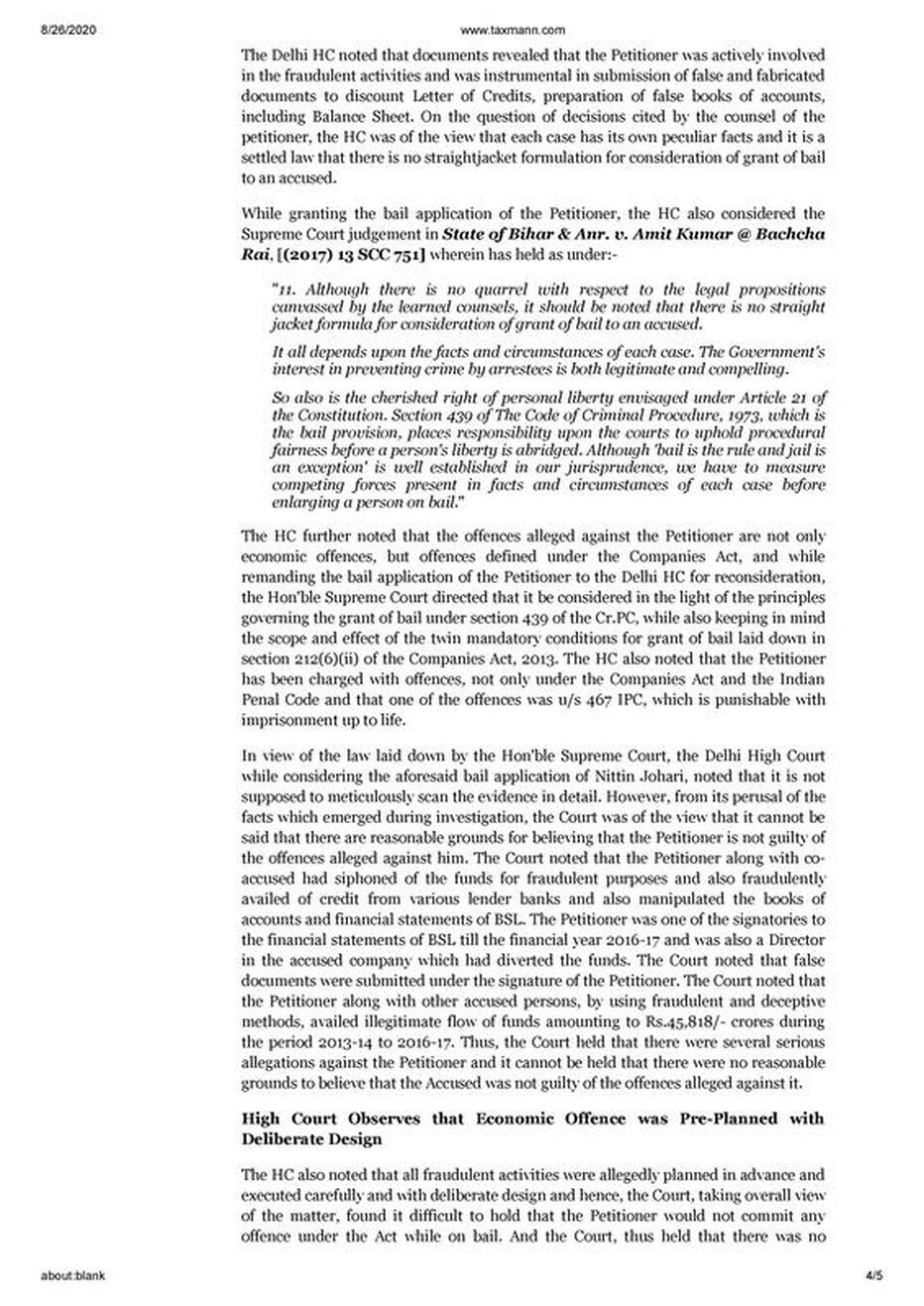
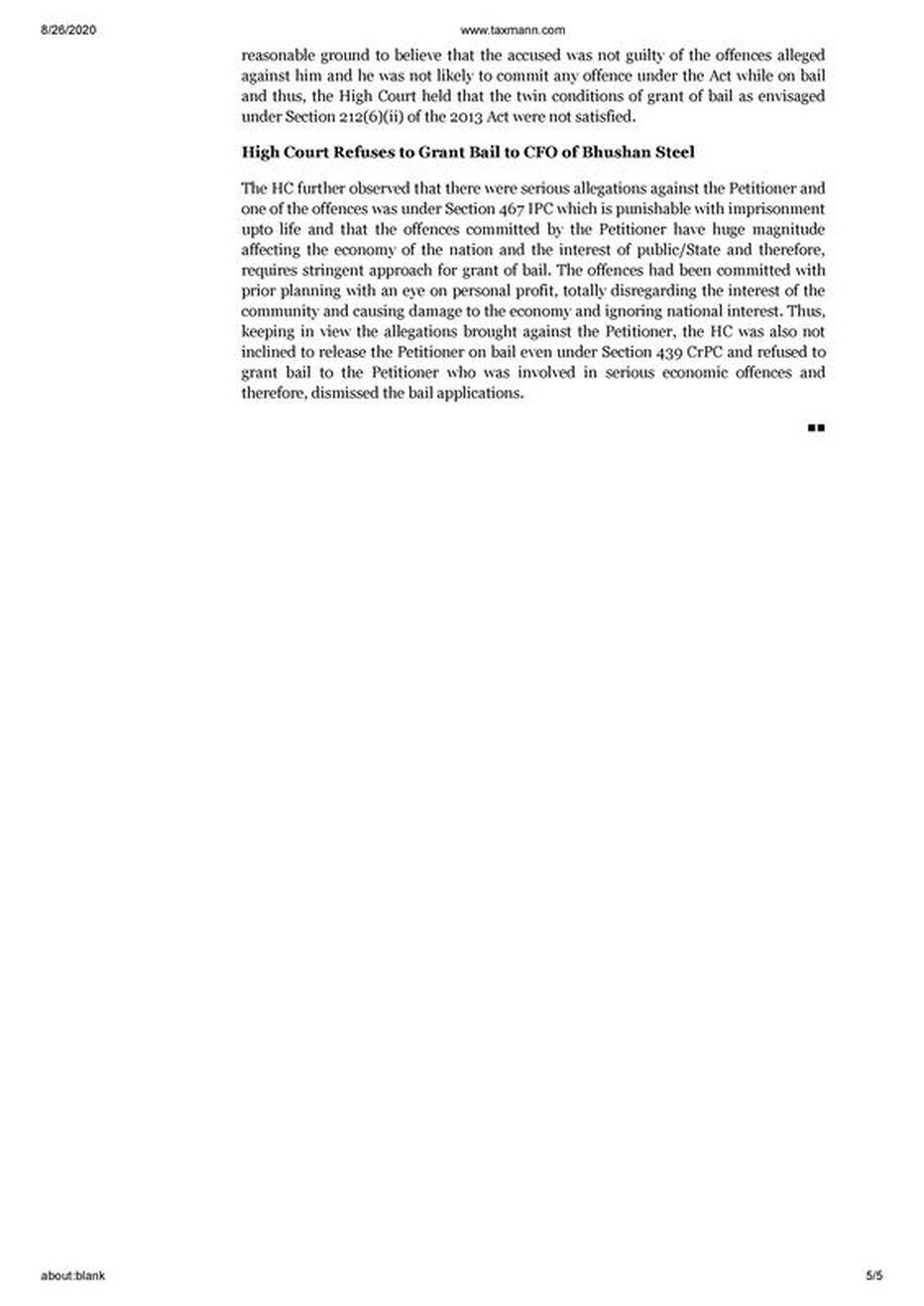
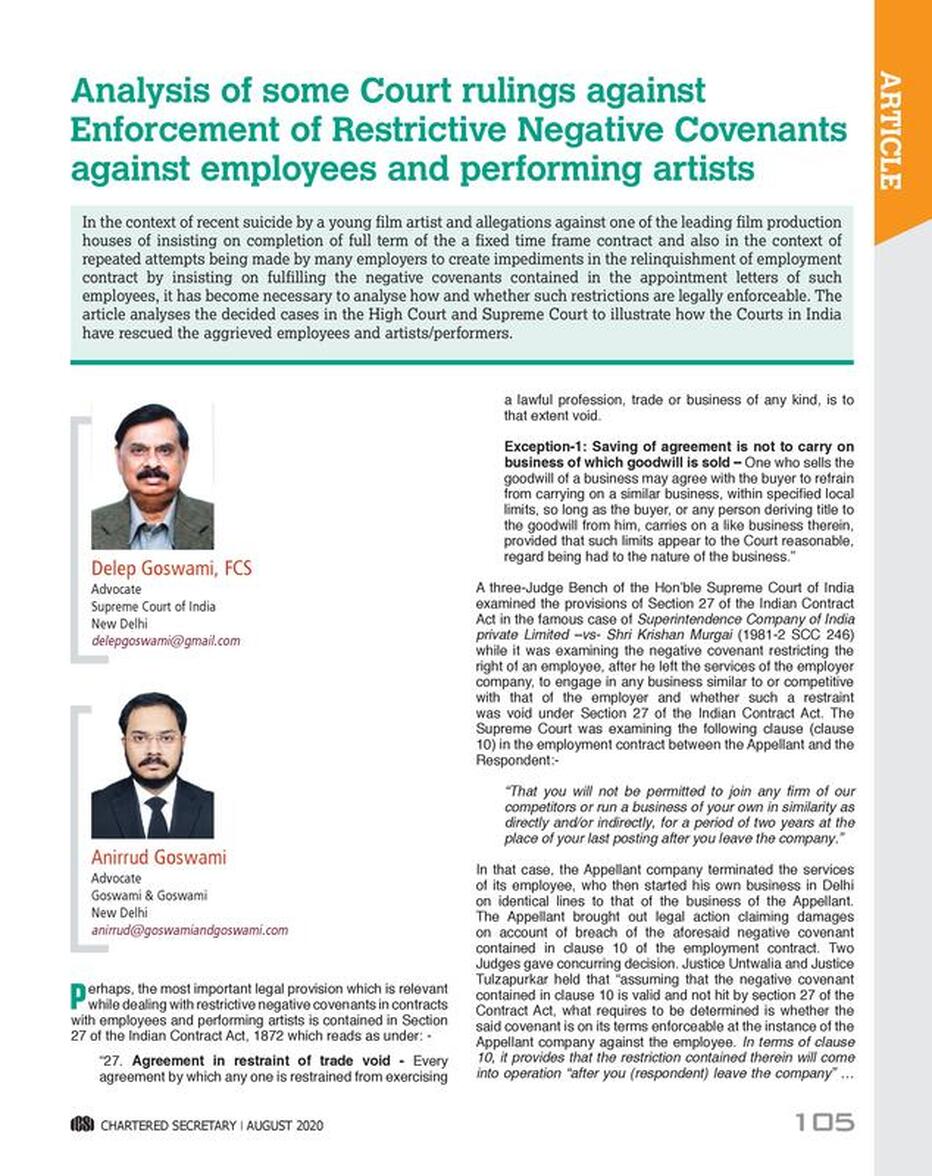
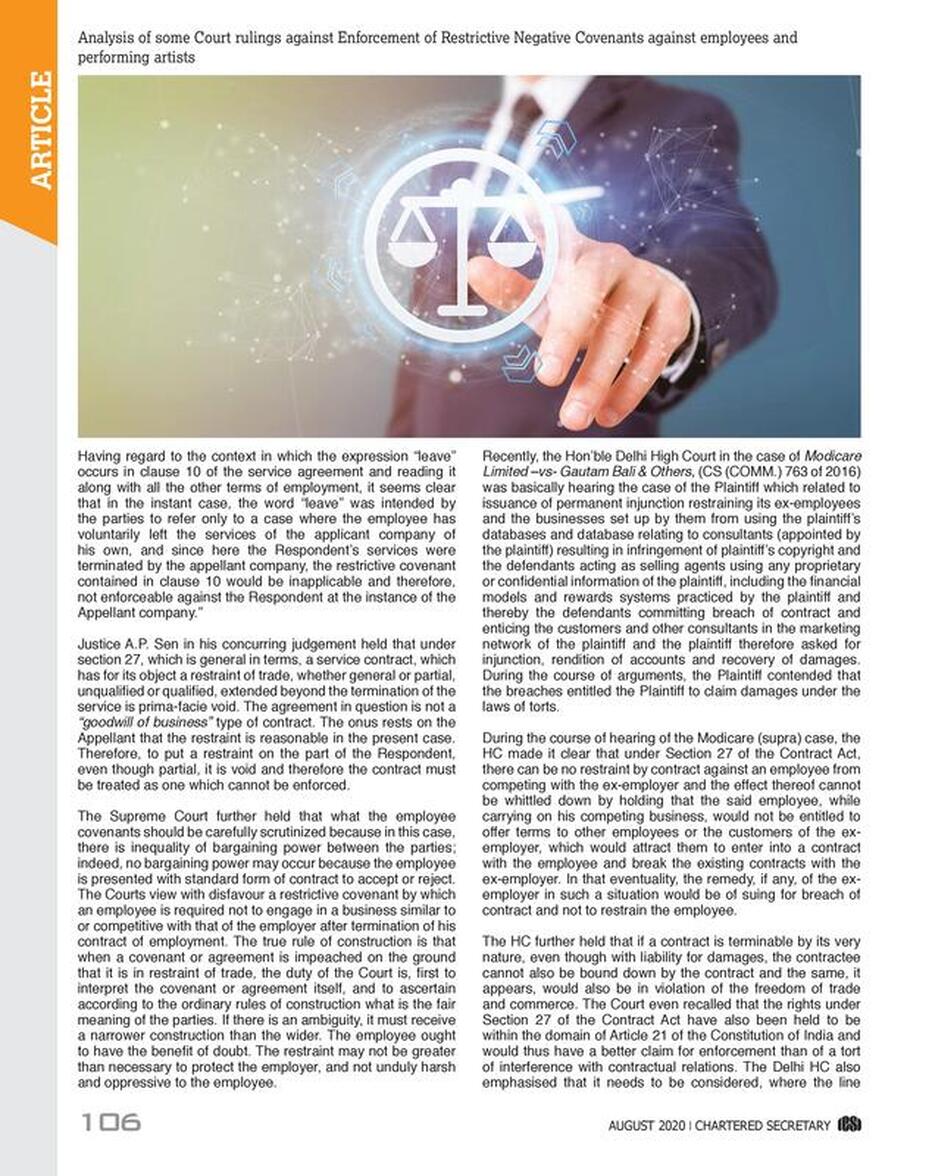
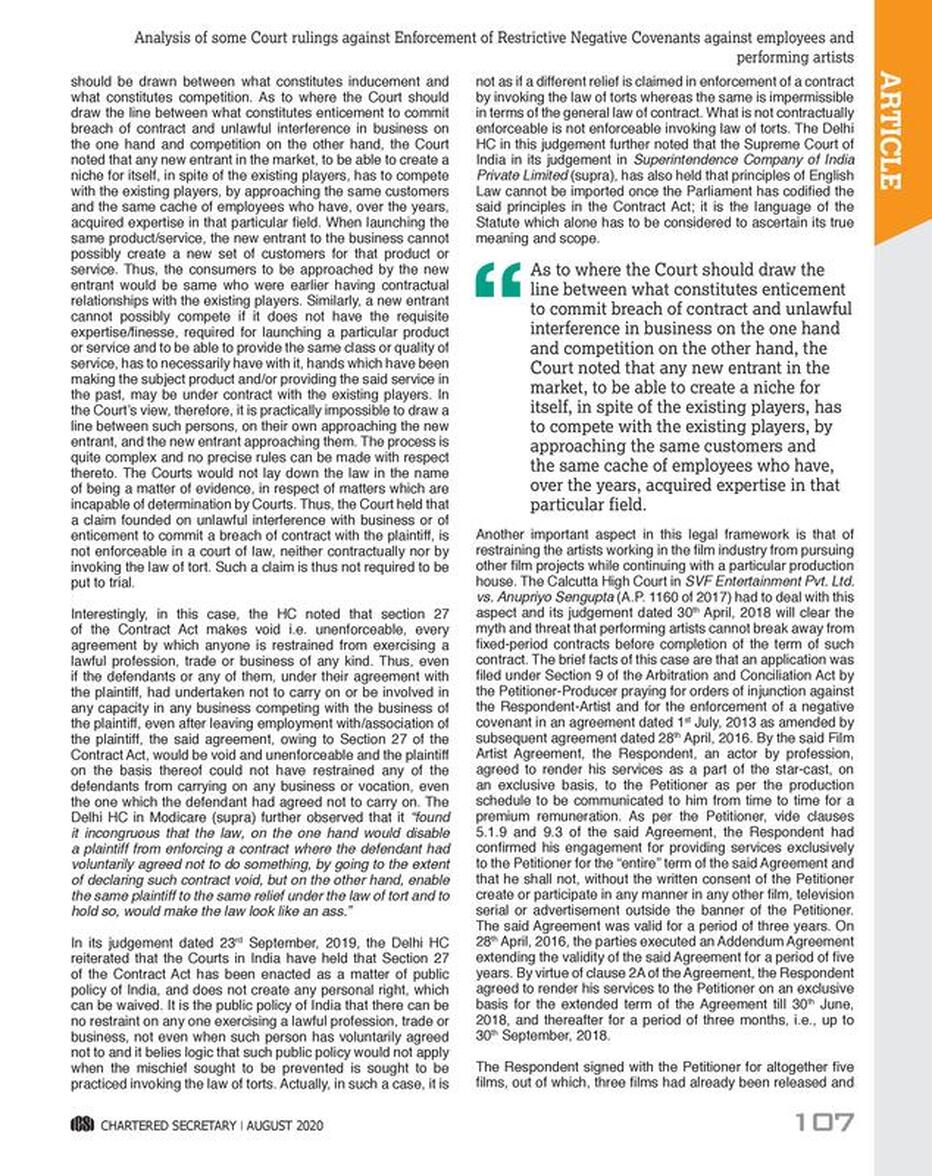
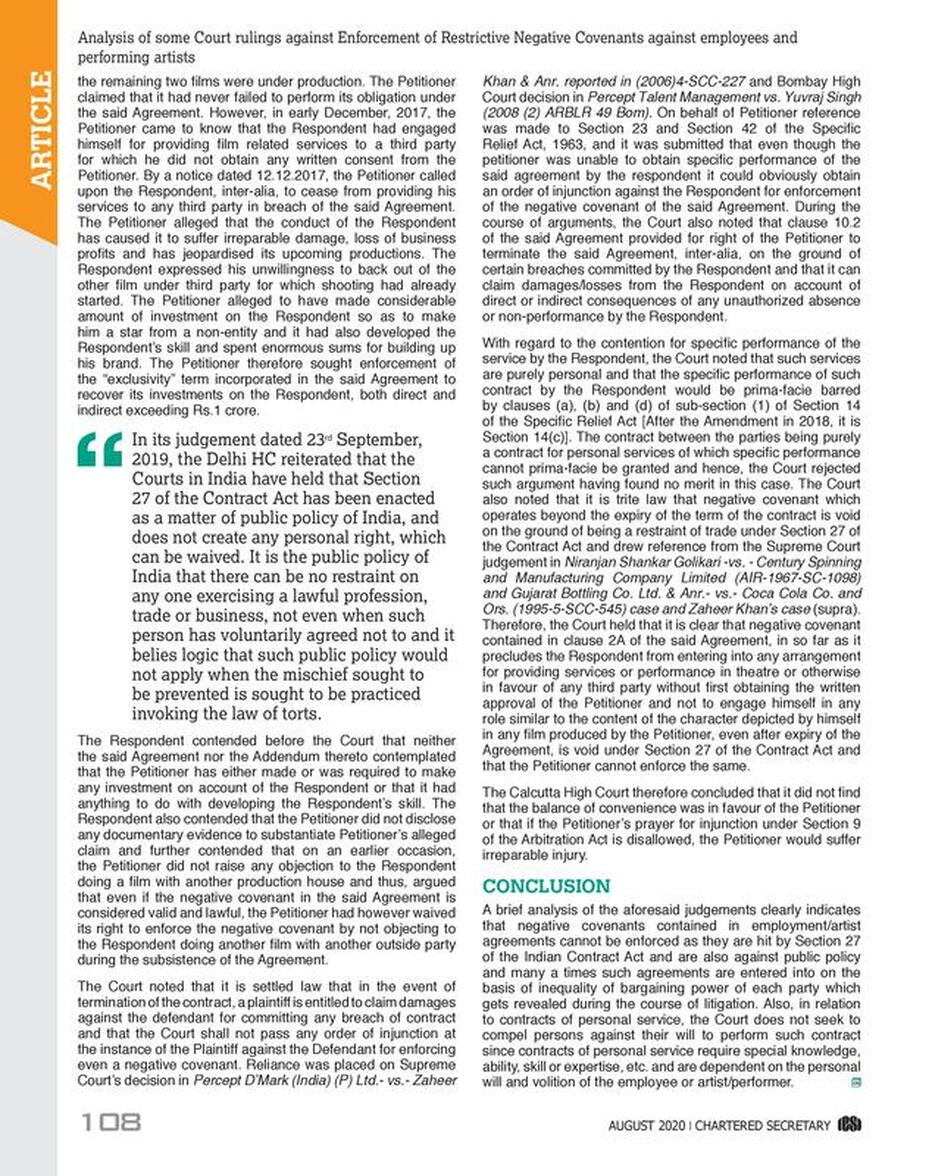
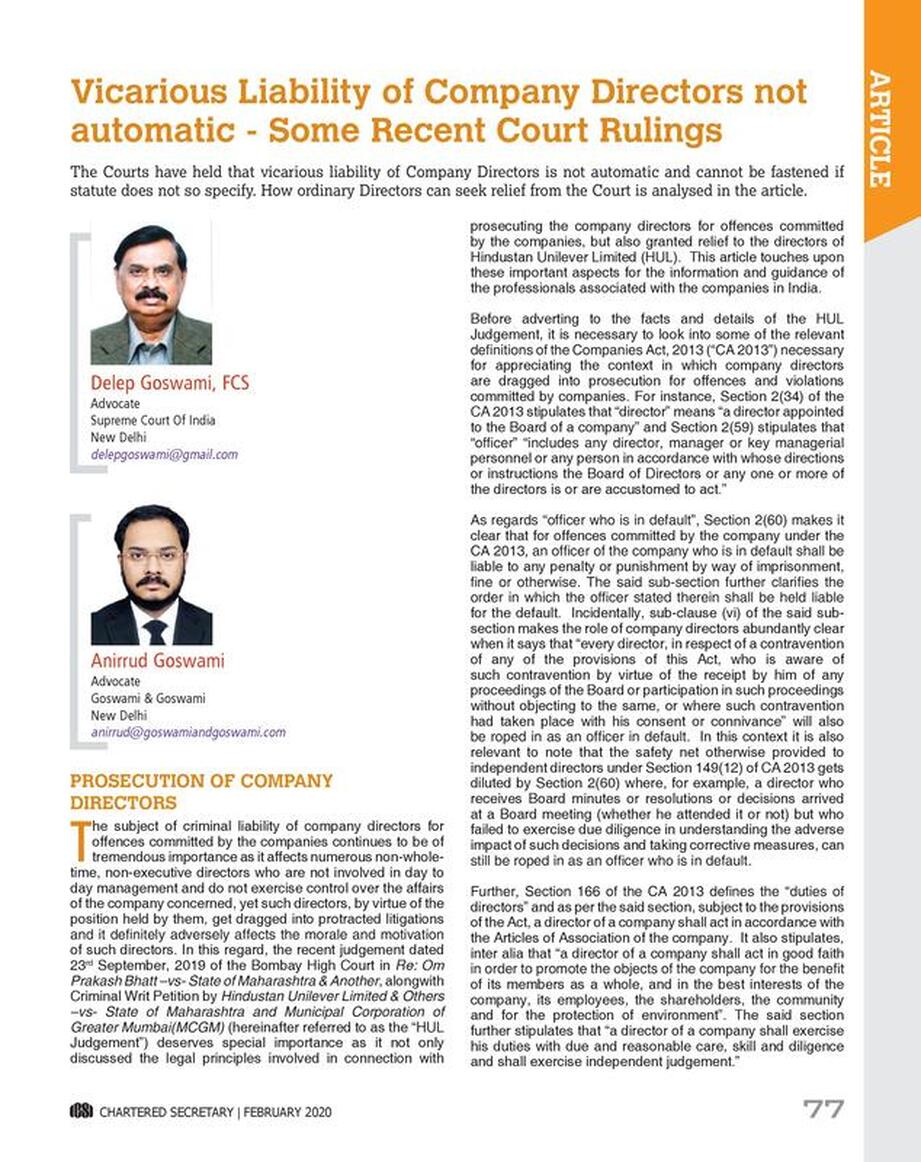
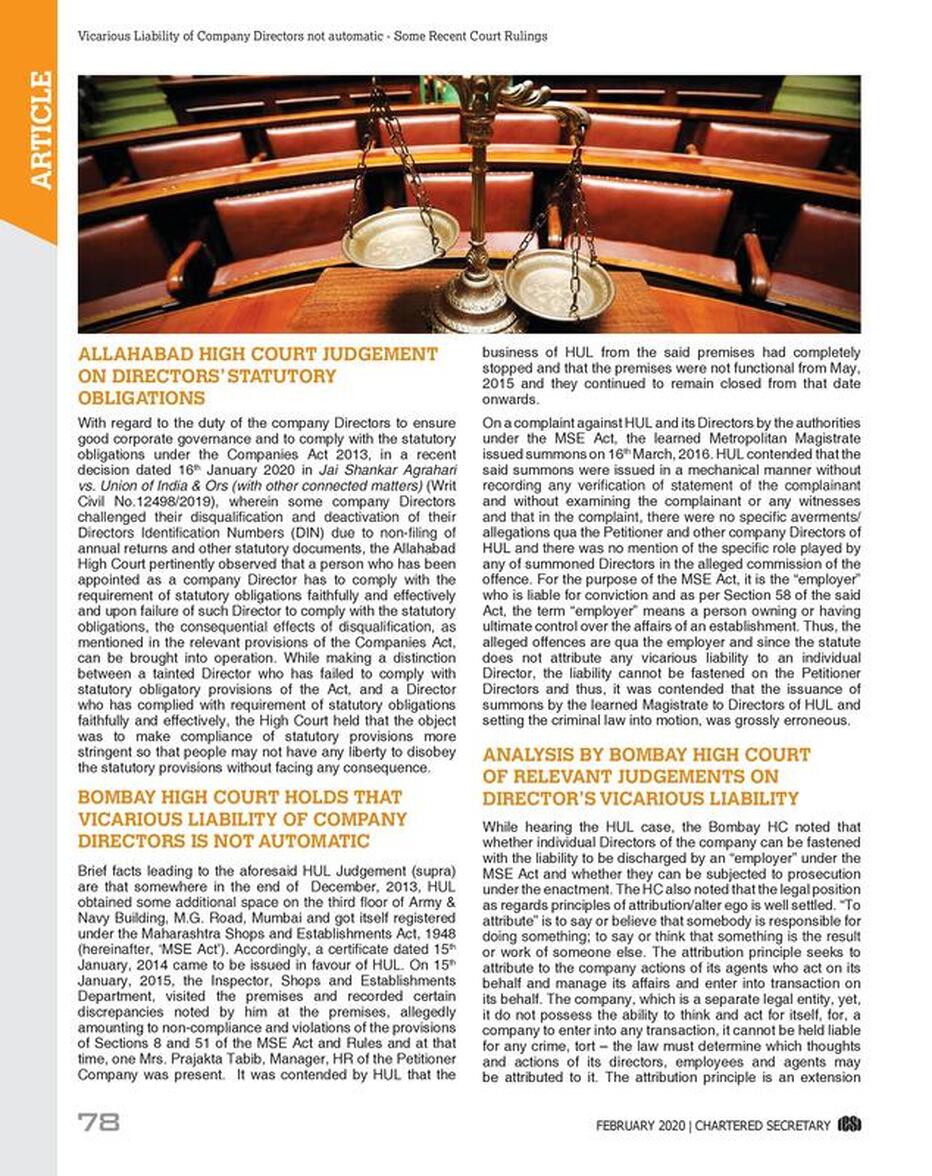
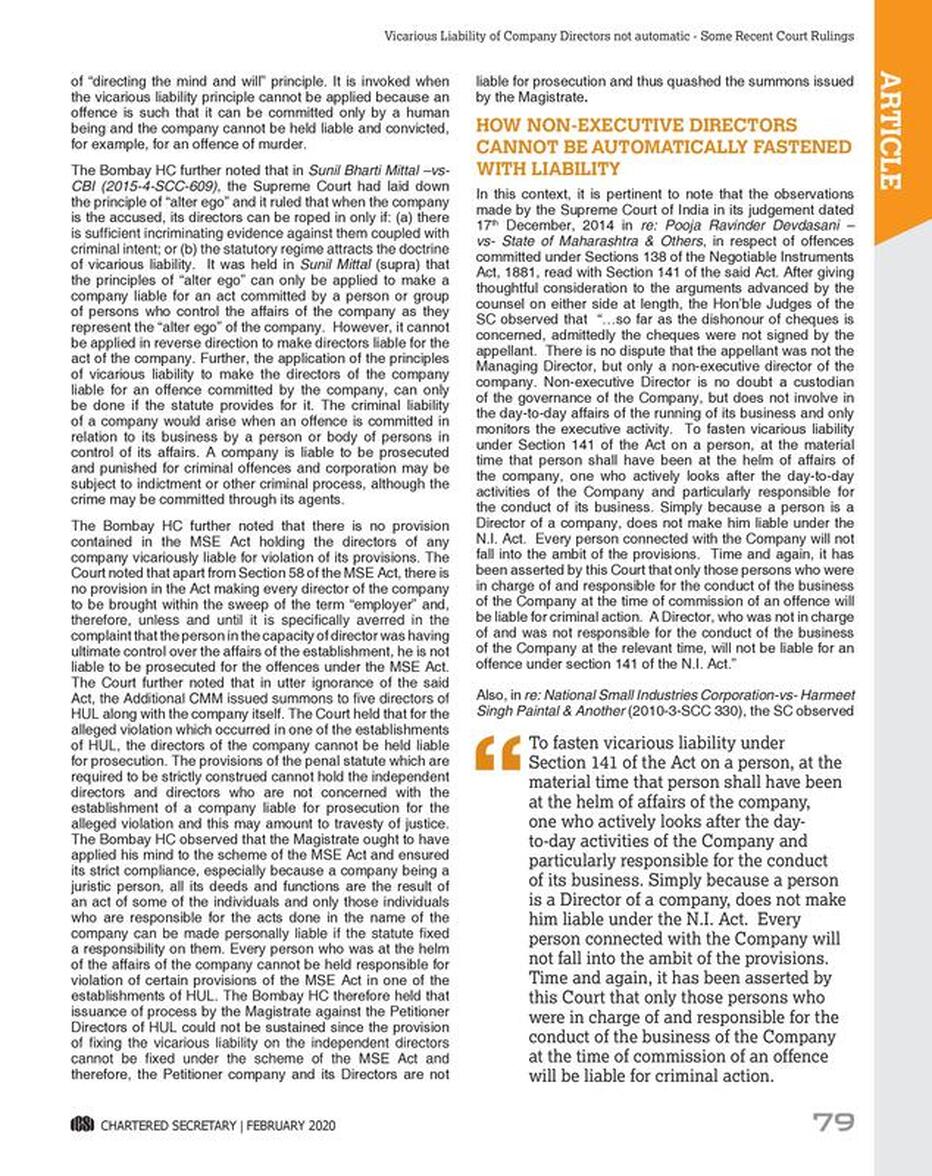
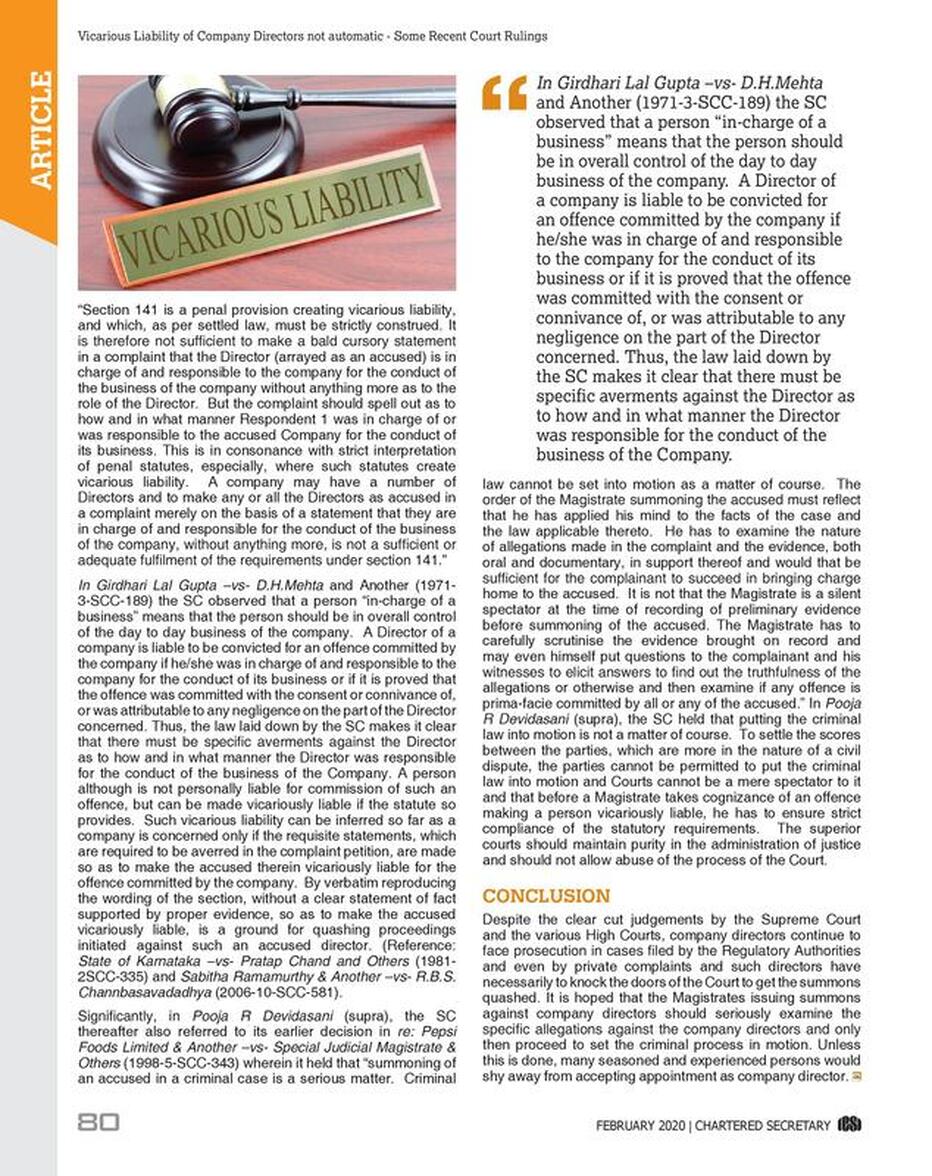
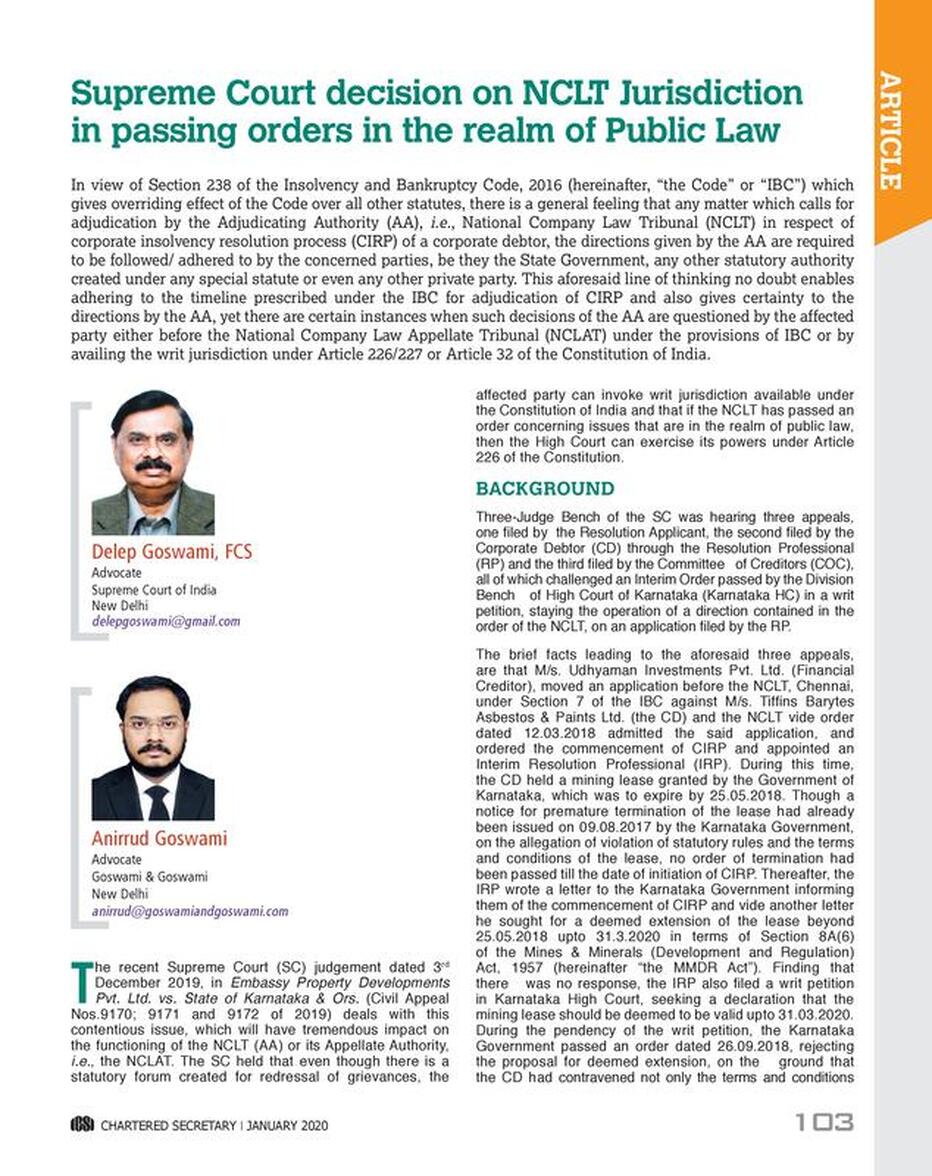
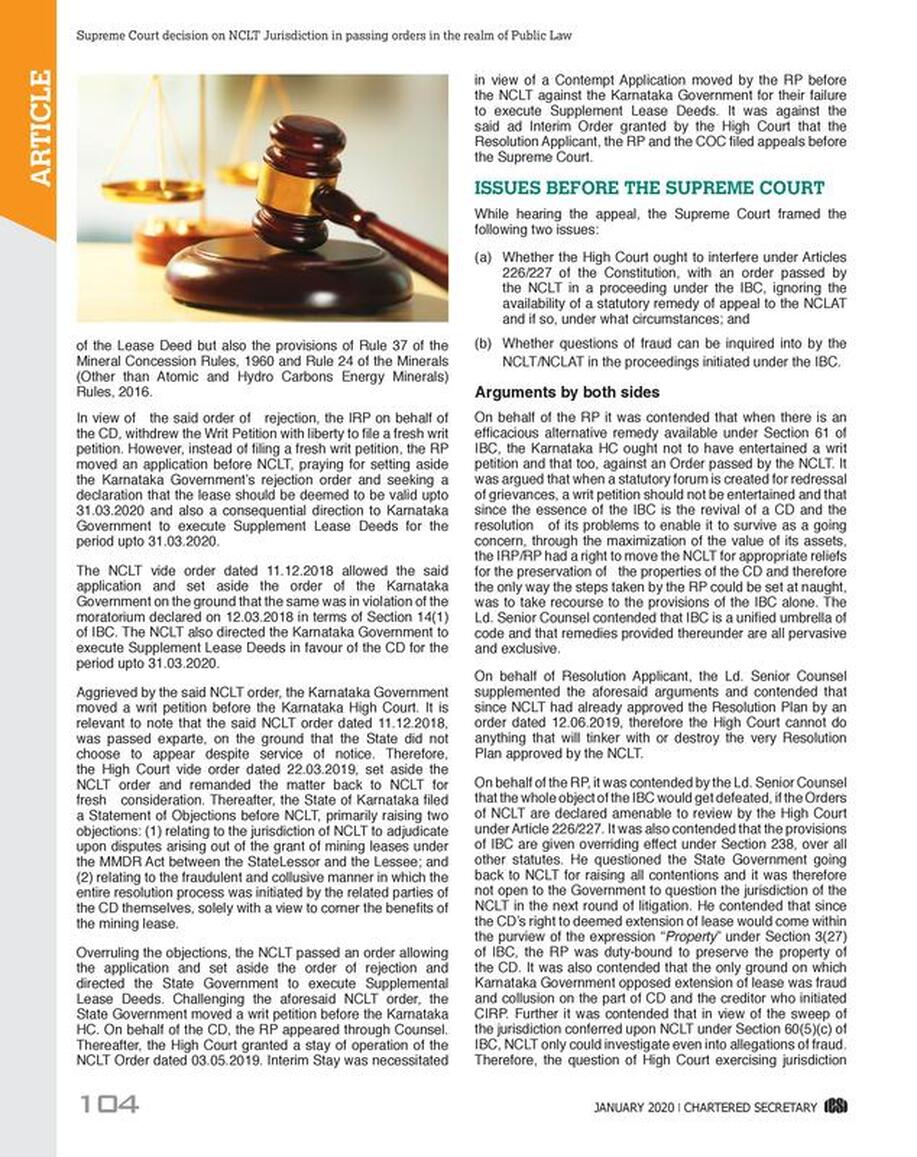
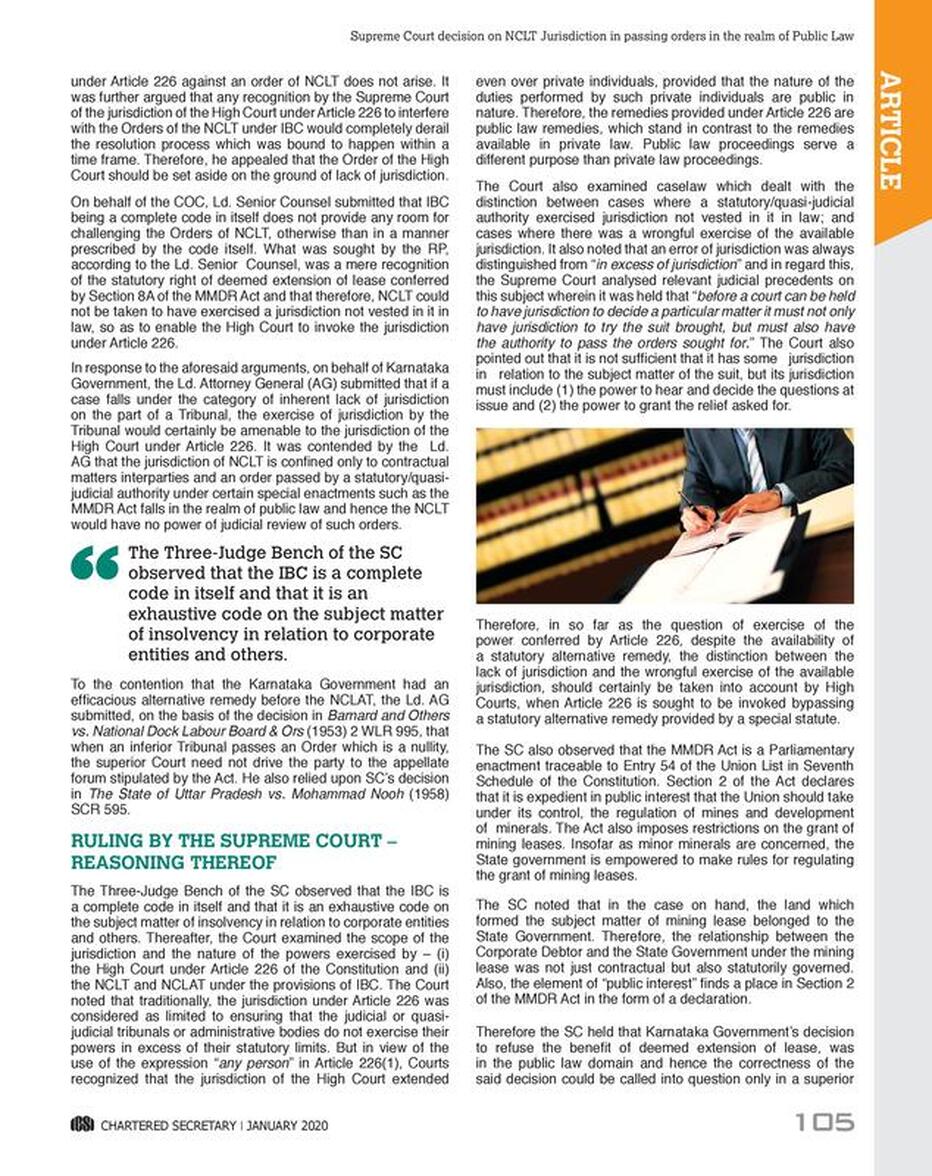
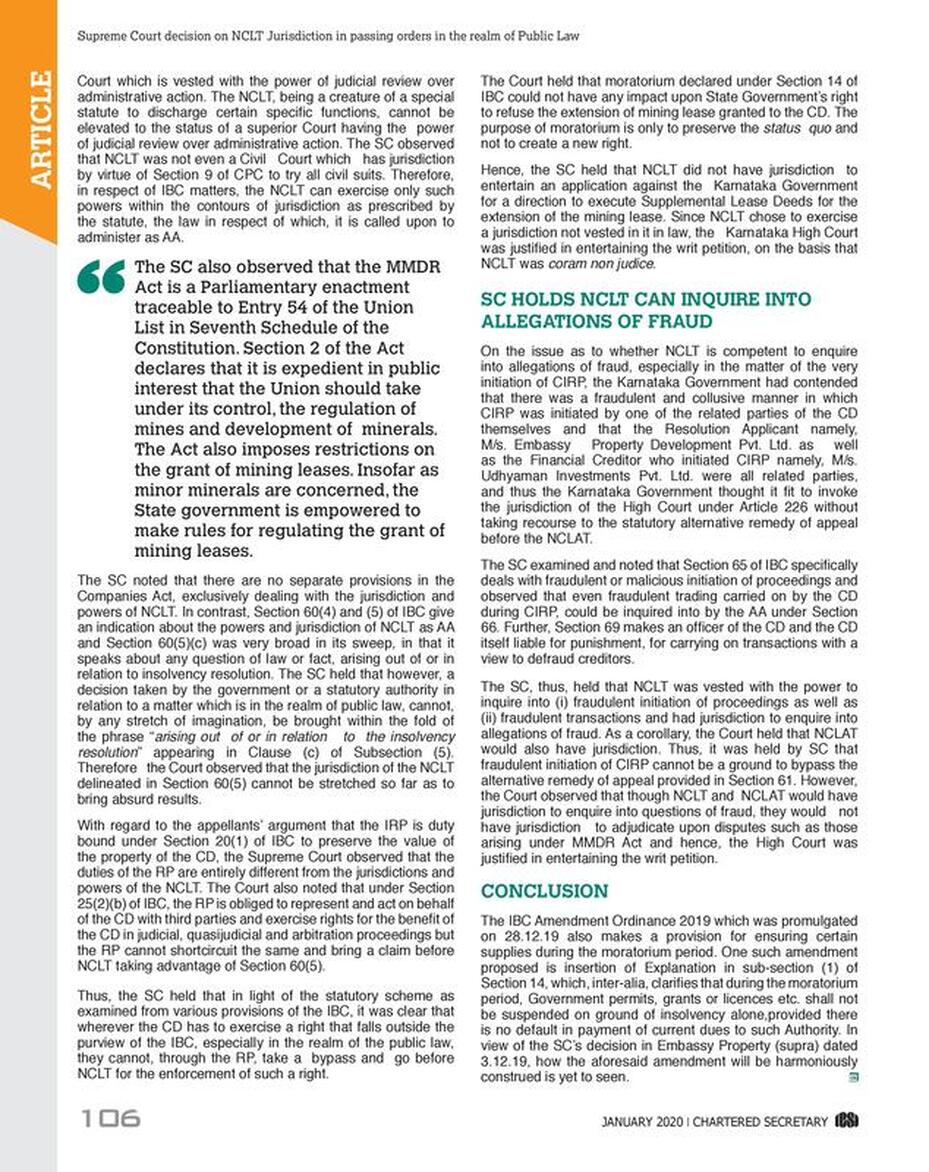


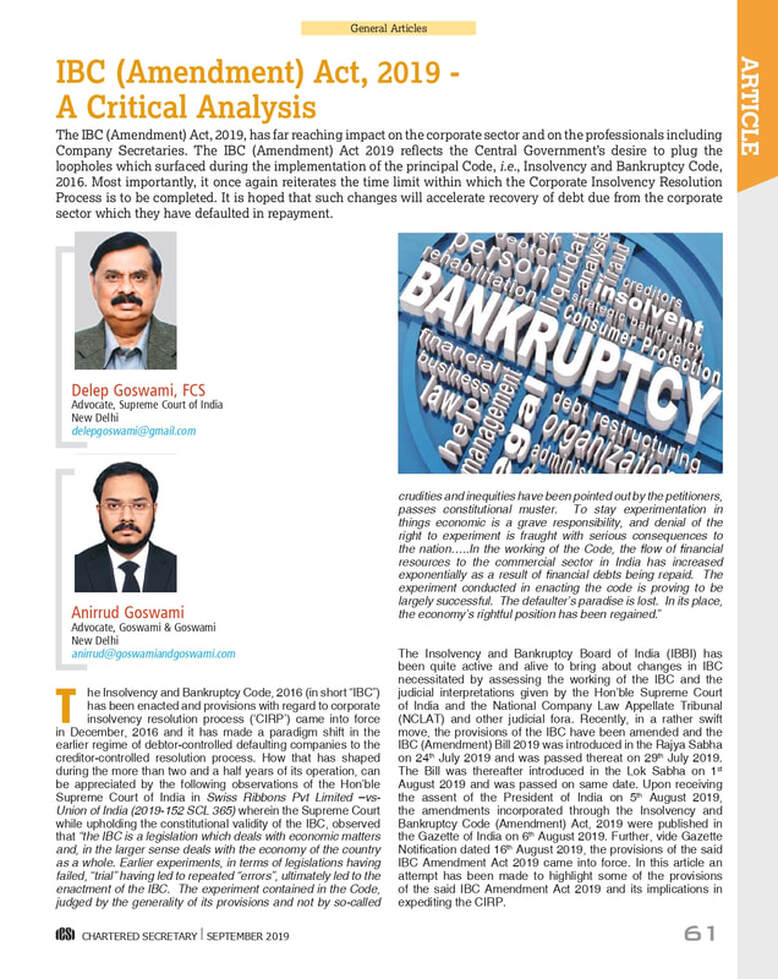
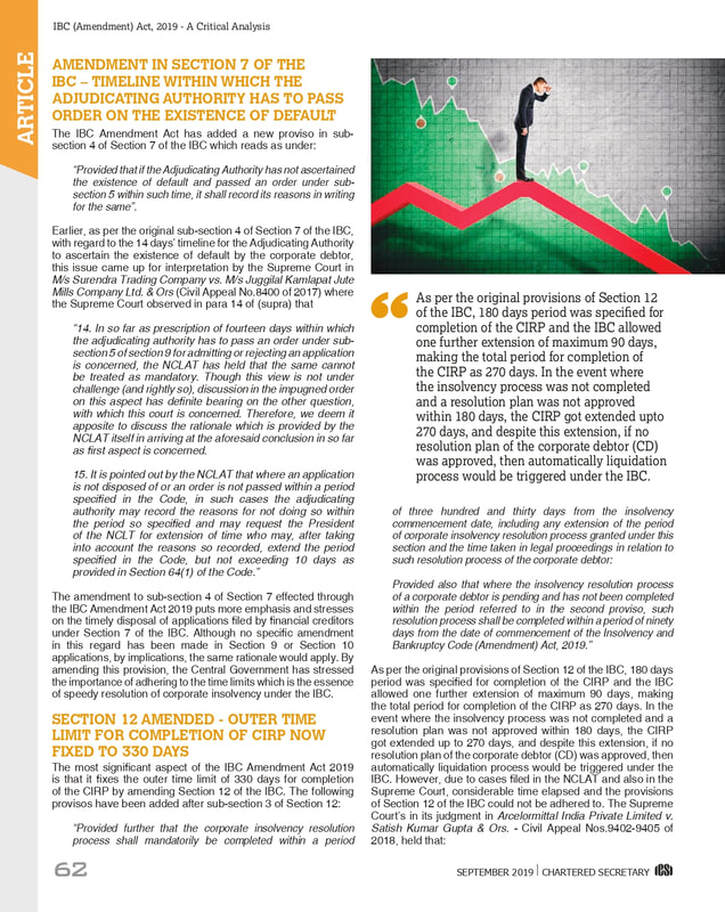
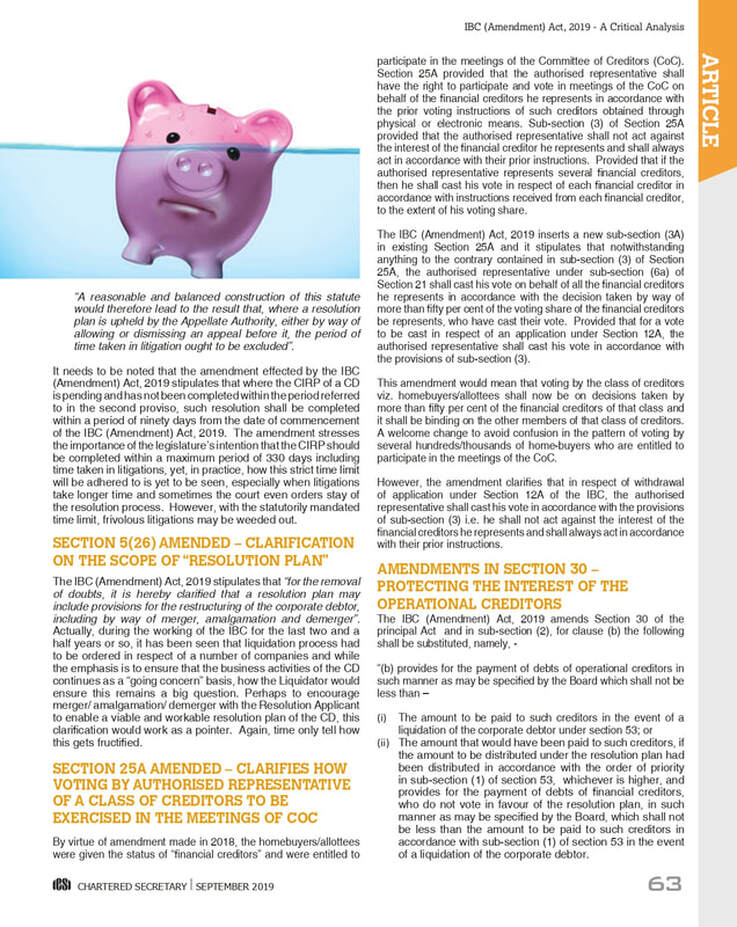
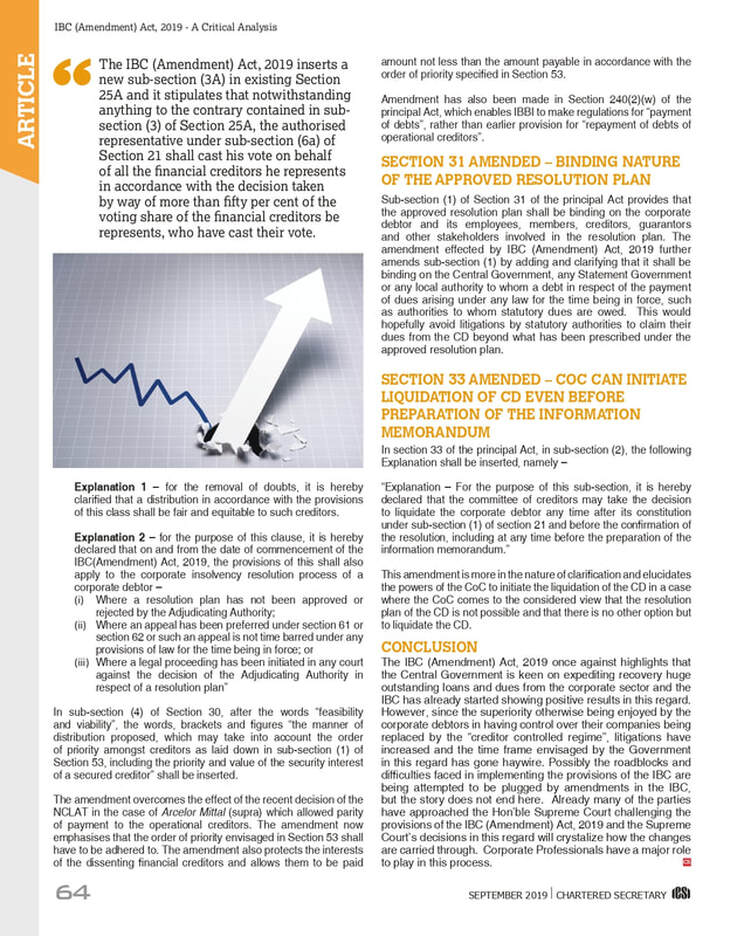
 RSS Feed
RSS Feed
